Here are my favorite wedding love poems categorized:
- Romantic wedding love poems
- Wedding poems for bride and groom
- Rhyming wedding poems
- Famous poems about marriage
So if you want the best wedding love poems, then you’re in the right place.
Keep reading!
- 55 Inspiring Women’s Day Poems
- 161 Adoring Valentine’s Poems for Her
- 61 Heartfelt Valentine’s Day Poems for Him
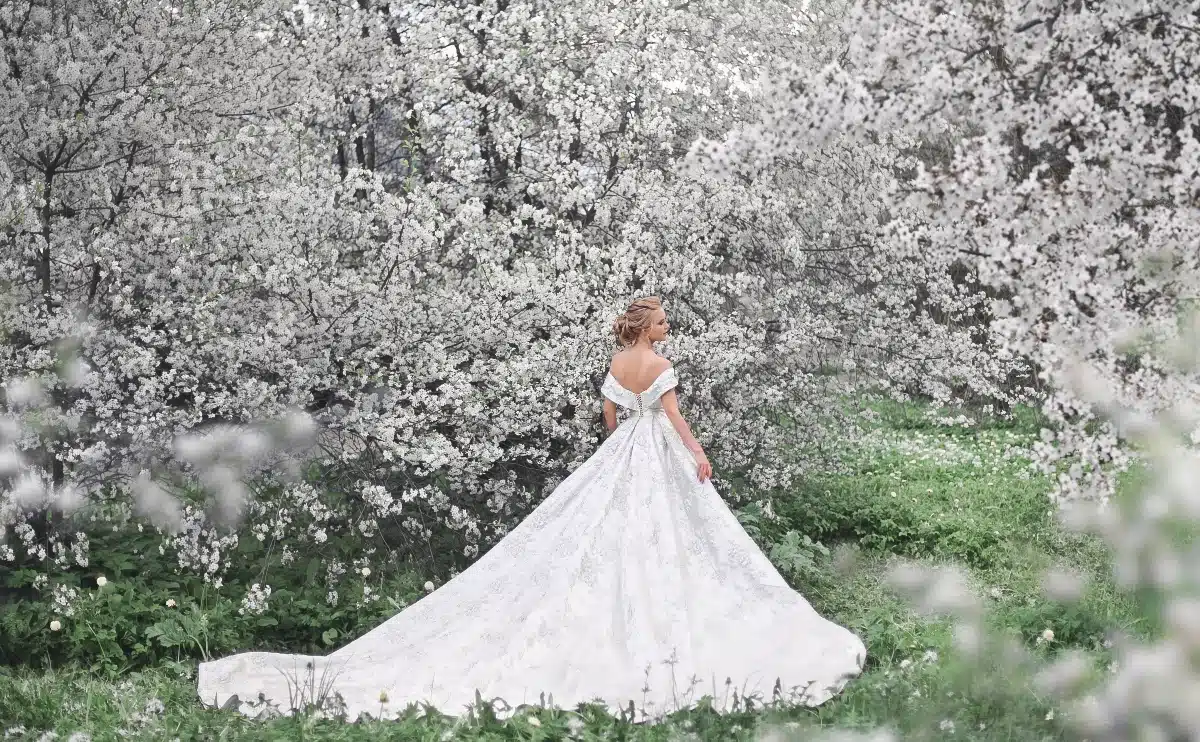
Passionate Wedding Love Poems
Celebrate the beauty and joy of marriage with our handpicked selection of the best wedding love poems.
From romantic and heartwarming wedding love poems to famous literary works that capture the essence of married life, you’ll find them all in one place here.
These poems are a tribute to the power of love that brings two people together in holy matrimony, and the profound bond that sustains them through life’s joys and challenges.
Whether you’re getting married or simply want to celebrate the love between two people, these poems offer a timeless and inspiring expression of the magic of love.
Let’s go!
My #1 Favorite Wedding Love Poem

“Freedom and Love” by Thomas Campbell
How delicious is the winning
Of a kiss at Love’s beginning,
When two mutual hearts are sighing
For the knot there’s no untying!
Yet remember, ‘midst your wooing,
Love has bliss, but Love has ruing;
Other smiles may make you fickle,
Tears for other charms may trickle.
Love he comes, and Love he tarries,
Just as fate or fancy carries;
Longest stays when sorest chidden,
Laughs and flies when press’d and bidden.
Bind the sea to slumber stilly,
Bind its odour to the lily,
Bind the aspen ne’er to quiver,
Then bind Love to last for ever.
Love’s a fire that needs renewal
Of fresh beauty for its fuel;
Love’s wing moults when caged and captured,
Only free he soars enraptured.
Can you keep the bee from ranging,
Or the ringdove’s neck from changing?
No! nor fetter’d Love from dying
In the knot there’s no untying.
Romantic Wedding Love Poems
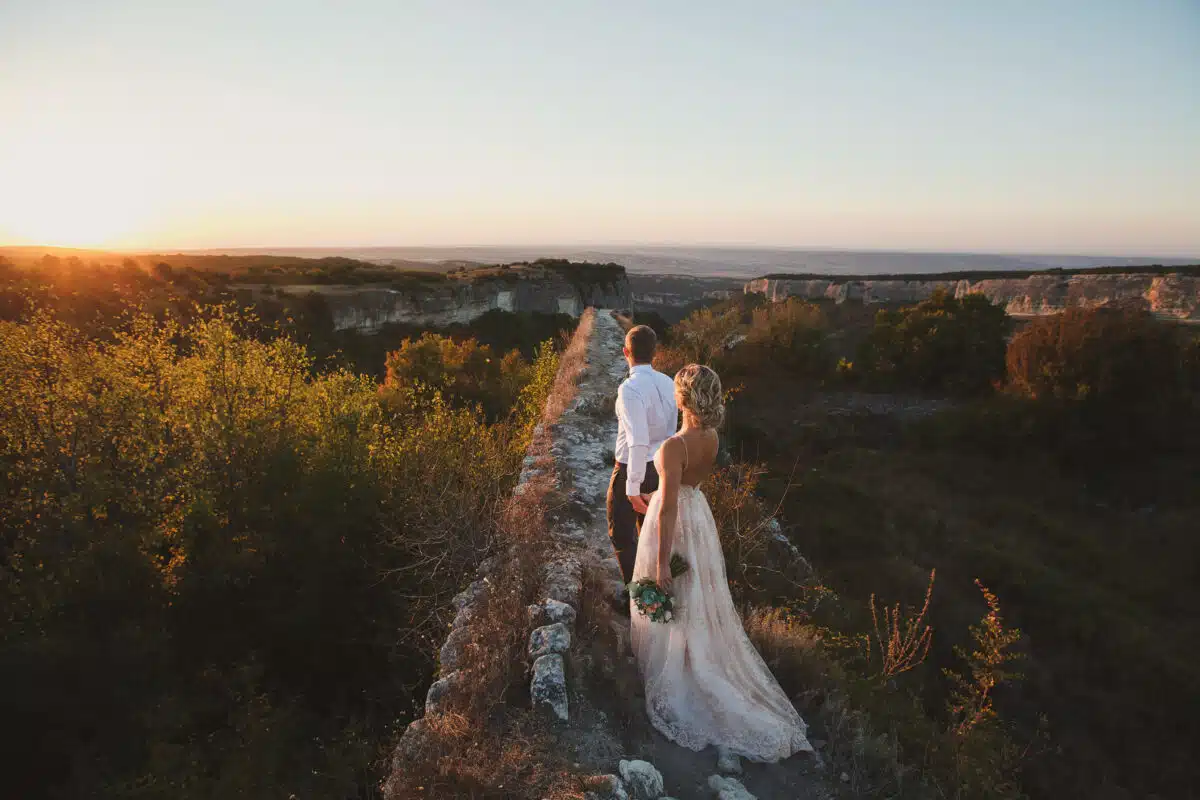
“Till Death Us Part” by Arthur Penrhyn Stanley
“Till death us part,”
Thus speaks the heart
When each to each repeats the words of doom;
For better and for worse,
Through blessing and through curse,
We shall be one, till life’s last hour shall come.
Life with its myriad grasp
Our yearning souls shall clasp
By ceaseless love and still expectant wonder;
In bonds that shall endure
Indissolubly sure
Till God in death shall part our paths asunder.
Till death us join!
Oh, word yet more divine,
Which to the breaking heart breathes hope sublime!
Through wasted hours,
And shattered powers,
We still are one, despite the change and time.
Death with his healing hand
Shall knit once more the band,
Which needs but that one link that none may sever;
Till, through the only Good,
Seen, felt, and understood,
The life in God shall make us one forever.
“Song” by Edgar Allan Poe
I saw thee on thy bridal day
When a burning blush came o’er thee,
Though happiness around thee lay,
The world all love before thee:
And in thine eye a kindling light
(Whatever it might be)
Was all on Earth my aching sight
Of Loveliness could see.
That blush, perhaps, was maiden shame
As such it well may pass
Though its glow hath raised a fiercer flame
In the breast of him, alas!
Who saw thee on that bridal day,
When that deep blush would come o’er thee,
Though happiness around thee lay,
The world all love before thee.
“The Newly-Wedded” by Winthrop Mackworth Praed
Now the rite is duly done,
Now the word is spoken,
And the spell has made us one
Which may ne’er be broken;
Rest we, dearest, in our home,
Roam we o’er the heather:
We shall rest, and we shall roam,
Shall we not? together.
From this hour the summer rose
Sweeter breathes to charm us;
From this hour the winter snows
Lighter fall to harm us:
Fair or foul—on land or sea—
Come the wind or weather,
Best and worst whate’er they be,
We shall share together.
Death, who friend from friend can part,
Brother rend from brother,
Shall but link us, heart and heart,
Closer to each other:
We will call his anger play,
Deem his dart a feather,
When we meet him on our way
Hand in hand together.
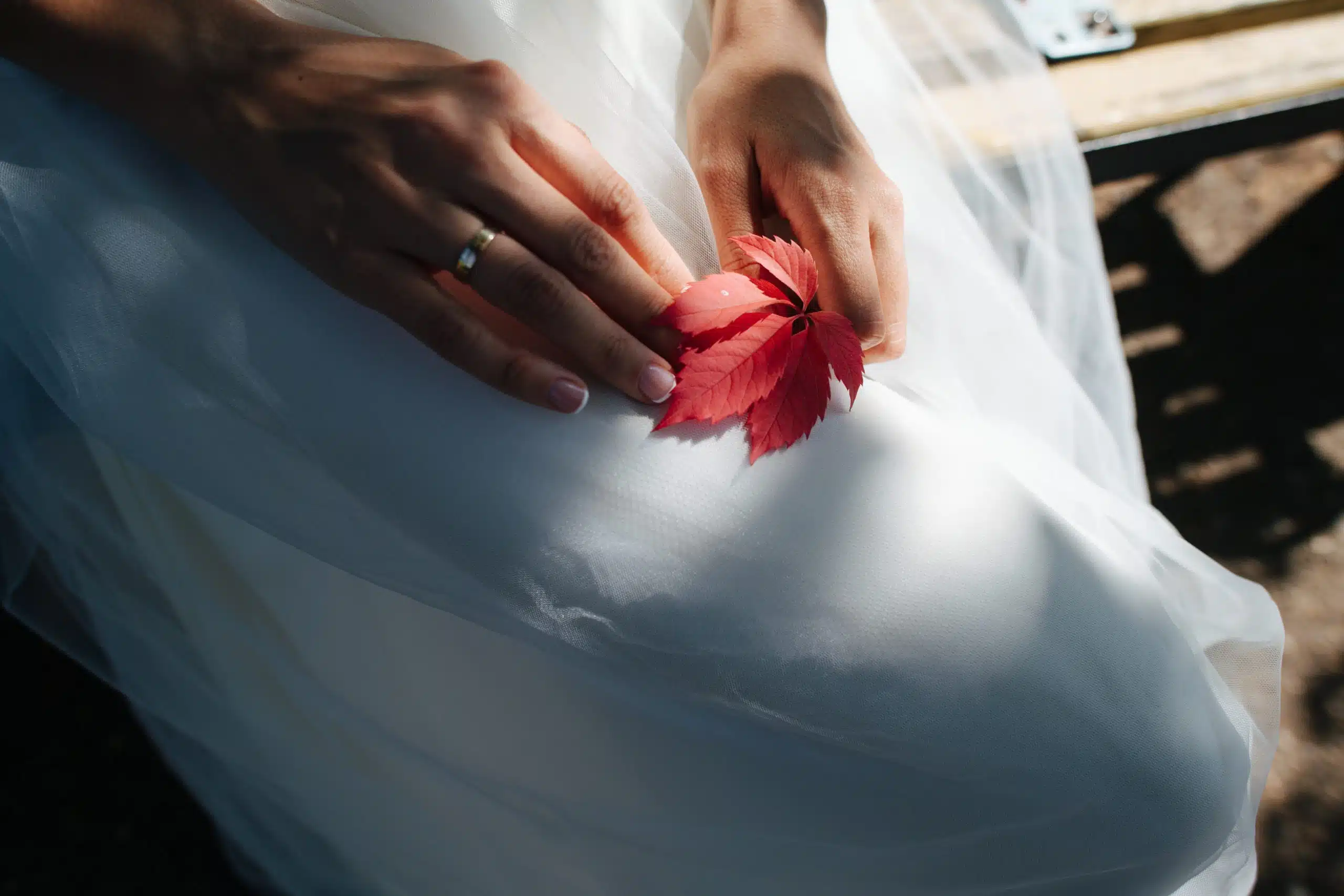
“My True-Love Hath My Heart” by Sir Philip Sidney
My true-love hath my heart, and I have his,
By just exchange one to the other given:
I hold his dear, and mine he cannot miss,
There never was a better bargain driven:
My true-love hath my heart, and I have his.
His heart in me keeps him and me in one;
My heart in him his thoughts and senses guides:
He loves my heart, for once it was his own;
I cherish his because in me it bides:
My true-love hath my heart, and I have his.
“My Wife’s a Winsome Wee Thing” by Robert Burns
She is a winsome wee thing,
She is a handsome wee thing,
She is a bonnie wee thing,
This sweet wee wife o’ mine.
I never saw a fairer,
I never lo’ed a dearer,
And neist my heart I ’ll wear her,
For fear my jewel tine.
She is a winsome wee thing,
She is a handsome wee thing,
She is a bonnie wee thing,
This sweet wife o’ mine.
The warld’s wrack we share o’t,
The wrastle and the care o’t:
Wi’ her I ’ll blythely bear it,
And think my lot divine.
“The Poet’s Bridal-Day Song” by Allan Cunningham
O, my love’s like the steadfast sun,
Or streams that deepen as they run;
Nor hoary hairs, nor forty years,
Nor moments between sighs and tears,
Nor nights of thought, nor days of pain,
Nor dreams of glory dreamed in vain,
Nor mirth, nor sweetest song that flows
To sober joys and soften woes,
Can make my heart or fancy flee,
One moment, my sweet wife, from thee.
Even while I muse, I see thee sit
In maiden bloom and matron wit;
Fair, gentle as when first I sued,
Ye seem, but of sedater mood;
Yet my heart leaps as fond for thee
As when, beneath Arbigland tree,
We stayed and wooed, and thought the moon
Set on the sea an hour too soon;
Or lingered mid the falling dew,
When looks were fond and words were few.
Though I see smiling at thy feet
Five sons and ae fair daughter sweet,
And time, and care, and birthtime woes
Have dimmed thine eye and touched thy rose,
To thee, and thoughts of thee, belong
Whate’er charms me in tale or song.
When words descend like dews, unsought,
With gleams of deep, enthusiast thought,
And Fancy in her heaven flies free,
They come, my love, they come from thee.
O, when more thought we gave, of old,
To silver than some give to gold,
’T was sweet to sit and ponder o’er
How we should deck our humble bower;
’T was sweet to pull, in hope, with thee,
The golden fruit of fortune’s tree;
And sweeter still to choose and twine
A garland for that brow of thine,—
A song-wreath which may grace my Jean,
While rivers flow, and woods grow green.
At times there come, as come there ought,
Grave moments of sedater thought,
When Fortune frowns, nor lends our night
One gleam of her inconstant light;
And Hope, that decks the peasant’s bower,
Shines like a rainbow through the shower;
O, then I see, while seated nigh,
A mother’s heart shine in thine eye,
And proud resolve and purpose meek,
Speak of thee more than words can speak.
I think this wedded wife of mine
The best of all that ’s not divine.
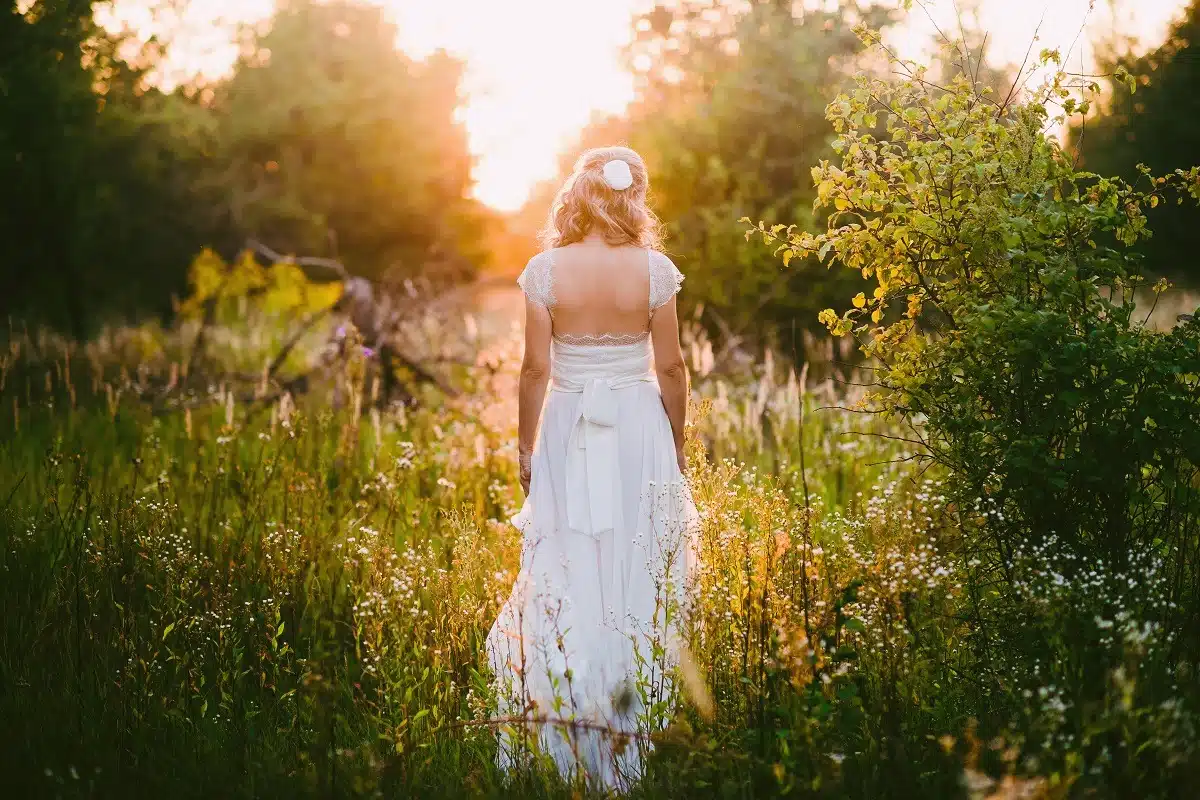
“Were I But His Own Wife” by Ellen Mary Downing
Were I but his own wife, to guard and to guide him,
’T is little of sorrow should fall on my dear;
I ’d chant my low love-verses, stealing beside him,
So faint and so tender his heart would but hear;
I ’d pull the wild blossoms from valley and highland;
And there at his feet I would lay them all down;
I ’d sing him the songs of our poor stricken island,
Till his heart was on fire with a love like my own.
There ’s a rose by his dwelling—I ’d tend the lone treasure,
That he might have flowers when the summer would come;
There ’s a harp in his hall—I would wake its sweet measure,
For he must have music to brighten his home.
Were I but his own wife, to guide and to guard him,
’T is little of sorrow should fall on my dear;
For every kind glance my whole life would award him—
In sickness I ’d soothe and in sadness I ’d cheer.
My heart is a fount welling upward for ever,
When I think of my true-love, by night or by day;
That heart keeps its faith like a fast-flowing river
Which gushes for ever and sings on its way.
I have thoughts full of peace for his soul to repose in,
Were I but his own wife, to win and to woo—
Oh, sweet, if the night of misfortune were closing,
To rise like the morning star, darling for you!
“Where Love Is” by Amelia Josephine Burr
By the rosy cliffs of Devon, on a green hill’s crest,
I would build me a house as a swallow builds its nest;
I would curtain it with roses, and the wind should breathe to me
The sweetness of the roses and the saltness of the sea.
Where the Tuscan olives whiten in the hot blue day,
I would hide me from the heat in a little hut of gray,
While the singing of the husbandman should scale my lattice green
From the golden rows of barley that the poppies blaze between.
Narrow is the street, Dear, and dingy are the walls
Wherein I wait your coming as the twilight falls.
All day with dreams I gild the grime till at your step I start—
Ah Love, my country in your arms—my home upon your heart!
“How Do I Love Thee? Let Me Count the Ways” by Elizabeth Barrett Browning
How do I love thee? Let me count the ways.
I love thee to the depth and breadth and height
My soul can reach, when feeling out of sight
For the ends of Being and ideal Grace.
I love thee to the level of every day’s
Most quiet need, by sun and candle-light.
I love thee freely, as men strive for Right;
I love thee purely, as they turn from Praise.
I love thee with the passion put to use
In my old griefs, and with my childhood’s faith.
I love thee with a love I seemed to lose
With my lost saints,—I love thee with the breath,
Smiles, tears, of all my life!—and, if God choose,
I shall but love thee better after death.
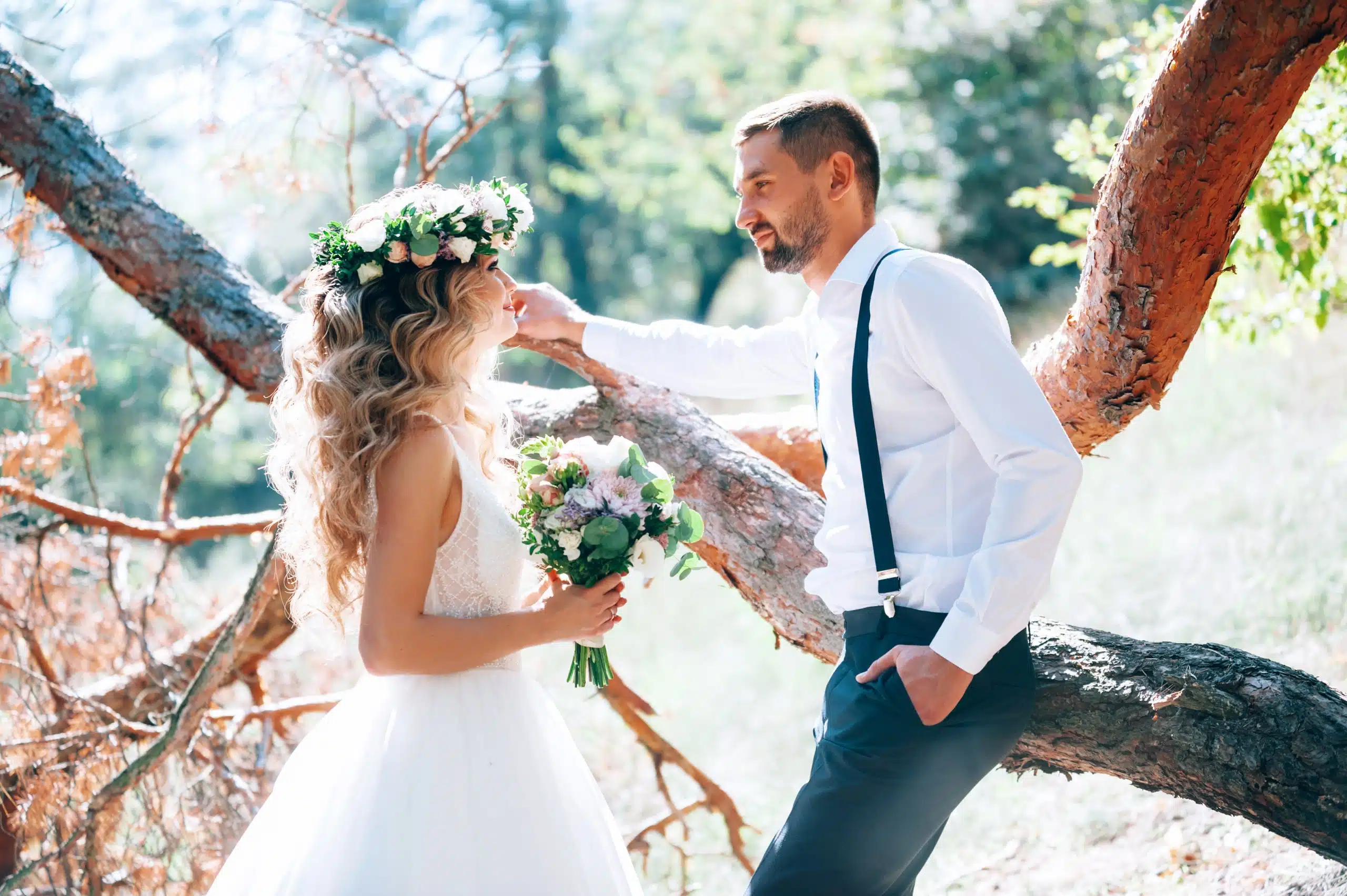
“Love” by Thomas Kibble Hervey
There are who say the lover’s heart
Is in the loved one’s merged;
O, never by love’s own warm art
So cold a plea was urged!
No!—hearts that love hath crowned or crossed
Love fondly knits together;
But not a thought or hue is lost
That made a part of either.
It is an ill-told tale that tells
Of “hearts by love made one;”
He grows who near another’s dwells
More conscious of his own;
In each spring up new thoughts and powers
That mid love’s warm, clear weather,
Together tend like climbing flowers,
And, turning, grow together.
Such fictions blink love’s better part,
Yield up its half of bliss;
The wells are in the neighbor heart
When there is thirst in this:
There findeth love the passion-flowers
On which it learns to thrive,
Makes honey in another’s bowers,
But brings it home to hive.
Love’s life is in its own replies,—
To each low beat it beats,
Smiles back the smiles, sighs back the sighs,
And every throb repeats.
Then, since one loving heart still throws
Two shadows in love’s sun,
How should two loving hearts compose
And mingle into one?
“Like a Laverock in the Lift” by Jean Ingelow
It ’s we two, it ’s we two for aye,
All the world, and we two, and Heaven be our stay!
Like a laverock 1 in the lift, 2 sing, O bonny bride!
All the world was Adam once, with Eve by his side.
What ’s the world, my lass, my love!—what can it do?
I am thine, and thou art mine; life is sweet and new.
If the world have missed the mark, let it stand by;
For we two have gotten leave, and once more will try.
Like a laverock in the lift, sing, O bonny bride!
It ’s we two, it ’s we two, happy side by side.
Take a kiss from me, thy man; now the song begins:
“All is made afresh for us, and the brave heart wins.”
When the darker days come, and no sun will shine,
Thou shalt dry my tears, lass, and I ’ll dry thine.
It ’s we two, it ’s we two, while the world ’s away,
Sitting by the golden sheaves on our wedding day.
“Come, Rest in This Bosom” by Thomas Moore
Come, rest in this bosom, my own stricken deer,
Though the herd have fled from thee, thy home is still here;
Here still is the smile, that no cloud can o’ercast,
And a heart and a hand all thy own to the last.
Oh! what was love made for, if ’t is not the same
Through joy and through torment, through glory and shame?
I know not, I ask not, if guilt ’s in that heart,
I but know that I love thee, whatever thou art.
Thou hast called me thy Angel in moments of bliss,
And thy Angel I ’ll be, mid the horrors of this,
Through the furnace, unshrinking, thy steps to pursue,
And shield thee, and save thee,—or perish there too!

“Minstrels’ Marriage Song” by Thomas Chatterton
First Minstrel.
The budding floweret blushes at the light:
The meads are sprinkled with the yellow hue;
In daisied mantles is the mountain dight;
The slim young cowslip bendeth with the dew;
The trees enleafèd, into heaven straught,
When gentle winds do blow, to whistling din are brought.
The evening comes and brings the dew along;
The ruddy welkin sheeneth to the eyne;
Around the ale-stake minstrels sing the song;
Young ivy round the doorpost doth entwine;
I lay me on the grass; yet, to my will,
Albeit all is fair, there lacketh something still.
Second Minstrel.
So Adam thought, what time, in Paradise,
All heaven and earth did homage to his mind.
In woman and none else man’s pleasaunce lies,
As instruments of joy are kind with kind.
Go, take a wife unto thine arms, and see
Winter and dusky hills will have a charm for thee.
“Because Thou Hast the Power and Own’St the Grace” by Elizabeth Barrett Browning
Because thou hast the power and own’st the grace
To look through and behind this mask of me,
(Against which, years have beat thus blanchingly
With their rains,) and behold my soul’s true face,
The dim and weary witness of life’s race,—
Because thou hast the faith and love to see,
Through that same soul’s distracting lethargy,
The patient angel waiting for a place
In the new Heavens,—because nor sin nor woe,
Nor God’s infliction, nor death’s neighborhood,
Nor all which others viewing, turn to go,
Nor all which makes me tired of all, self-viewed,—
Nothing repels thee,… Dearest, teach me so
To pour out gratitude, as thou dost, good!
“When Stars Are in the Quiet Skies” by Lord Edward Bulwer-Lytton
When stars are in the quiet skies,
Then most I pine for thee;
Bend on me then thy tender eyes,
As stars look on the sea!
For thoughts, like waves that glide by night,
Are stillest when they shine;
Mine earthly love lies hushed in light
Beneath the heaven of thine.
There is an hour when angels keep
Familiar watch o’er men,
When coarser souls are wrapped in sleep—
Sweet spirit, meet me then!
There is an hour when holy dreams
Through slumber fairest glide;
And in that mystic hour it seems
Thou shouldst be by my side.
My thoughts of thee too sacred are
For daylight’s common beam:
I can but know thee as my star,
My angel and my dream;
When stars are in the quiet skies,
Then most I pine for thee;
Bend on me then thy tender eyes,
As stars look on the sea!
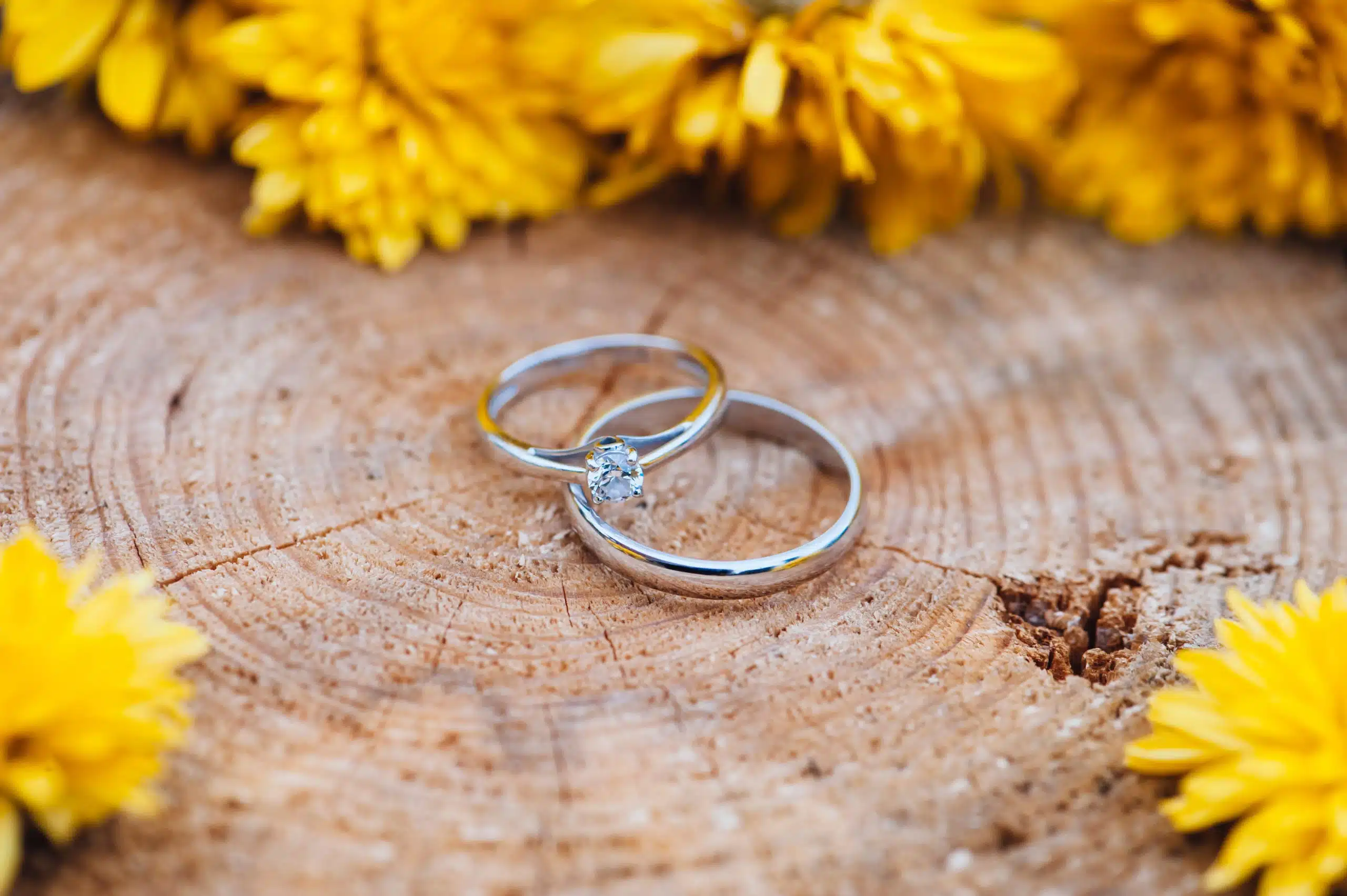
“Let Me Not to the Marriage of True Minds” by William Shakespeare
Let me not to the marriage of true minds
Admit impediments: love is not love,
Which alters when it alteration finds,
Or bends with the remover to remove;
O, no! it is an ever-fixèd mark,
That looks on tempests, and is never shaken;
It is the star to every wandering bark,
Whose worth ’s unknown, although his height be taken.
Love ’s not Time’s fool, though rosy lips and cheeks
Within his bending sickle’s compass come;
Love alters not with his brief hours and weeks,
But bears it out even to the edge of doom.
If this be error, and upon me proved,
I never writ, nor no man ever loved.
“The Might of One Fair Face” by Michaelangelo
The might of one fair face sublimes my love,
For it hath weaned my heart from low desires;
Nor death I heed, nor purgatorial fires.
Thy beauty, antepast of joys above,
Instructs me in the bliss that saints approve;
For O, how good, how beautiful, must be
The God that made so good a thing as thee,
So fair an image of the heavenly Dove!
Forgive me if I cannot turn away
From those sweet eyes that are my earthly heaven,
For they are guiding stars, benignly given
To tempt my footsteps to the upward way;
And if I dwell too fondly in thy sight,
I live and love in God’s peculiar light.
“If I Leave All for Thee, Wilt Thou Exchange” by Elizabeth Barrett Browning
If I leave all for thee, wilt thou exchange
And be all to me? Shall I never miss
Home-talk and blessing and the common kiss
That comes to each in turn, nor count it strange,
When I look up, to drop on a new range
Of walls and floors, another home than this?
Nay, wilt thou fill that place by me which is
Filled by dead eyes too tender to know change
That ’s hardest? If to conquer love, has tried,
To conquer grief, tries more, as all things prove,
For grief indeed is love and grief beside.
Alas, I have grieved so I am hard to love.
Yet love me—wilt thou? Open thine heart wide,
And fold within the wet wings of thy dove.
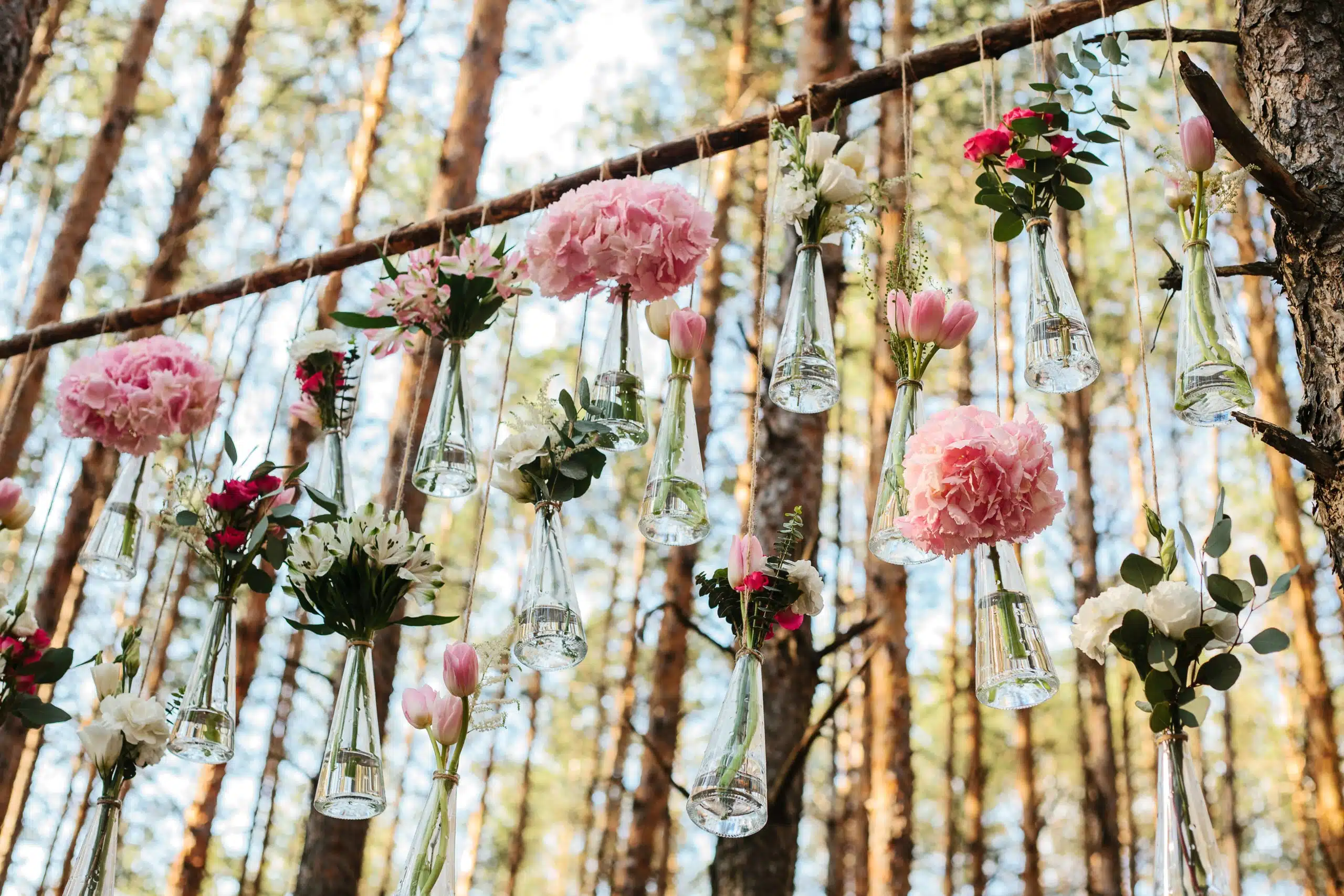
“Our Love Is Not a Fading, Earthly Flower” by James Russell Lowell
Our love is not a fading, earthly flower:
Its wingèd seed dropped down from Paradise,
And, nursed by day and night, by sun and shower,
Doth momently to fresher beauty rise:
To us the leafless autumn is not bare,
Nor winter’s rattling boughs lack lusty green,
Our summer hearts make summer’s fulness, where
No leaf, or bud, or blossom may be seen:
For nature’s life in love’s deep life doth lie,
Love,—whose forgetfulness is beauty’s death,
Whose mystic key these cells of Thou and I
Into the infinite freedom openeth,
And makes the body’s dark and narrow grate
The wind-flung leaves of Heaven’s palace-gate.
“Ah, How Sweet” by John Dryden
Ah, how sweet it is to love!
Ah, how gay is young desire!
And what pleasing pains we prove
When we first approach love’s fire!
Pains of love be sweeter far
Than all other pleasures are.
Sighs which are from lovers blown
Do but gently heave the heart:
E’en the tears they shed alone
Cure, like trickling balm, their smart.
Lovers, when they lose their breath,
Bleed away in easy death.
Love and Time with reverence use,
Treat them like a parting friend;
Nor the golden gifts refuse
Which in youth sincere they send:
For each year their price is more,
And they less simple than before.
Love, like spring-tides full and high,
Swells in every youthful vein;
But each tide does less supply,
Till they quite shrink in again.
If a flow in age appear,
’T is but rain, and runs not clear.
“Light” by Francis William Bourdillon
The night has a thousand eyes,
The day but one;
Yet the light of the bright world dies
With the dying sun.
The mind has a thousand eyes,
And the heart but one;
Yet the light of a whole life dies
When its love is done.
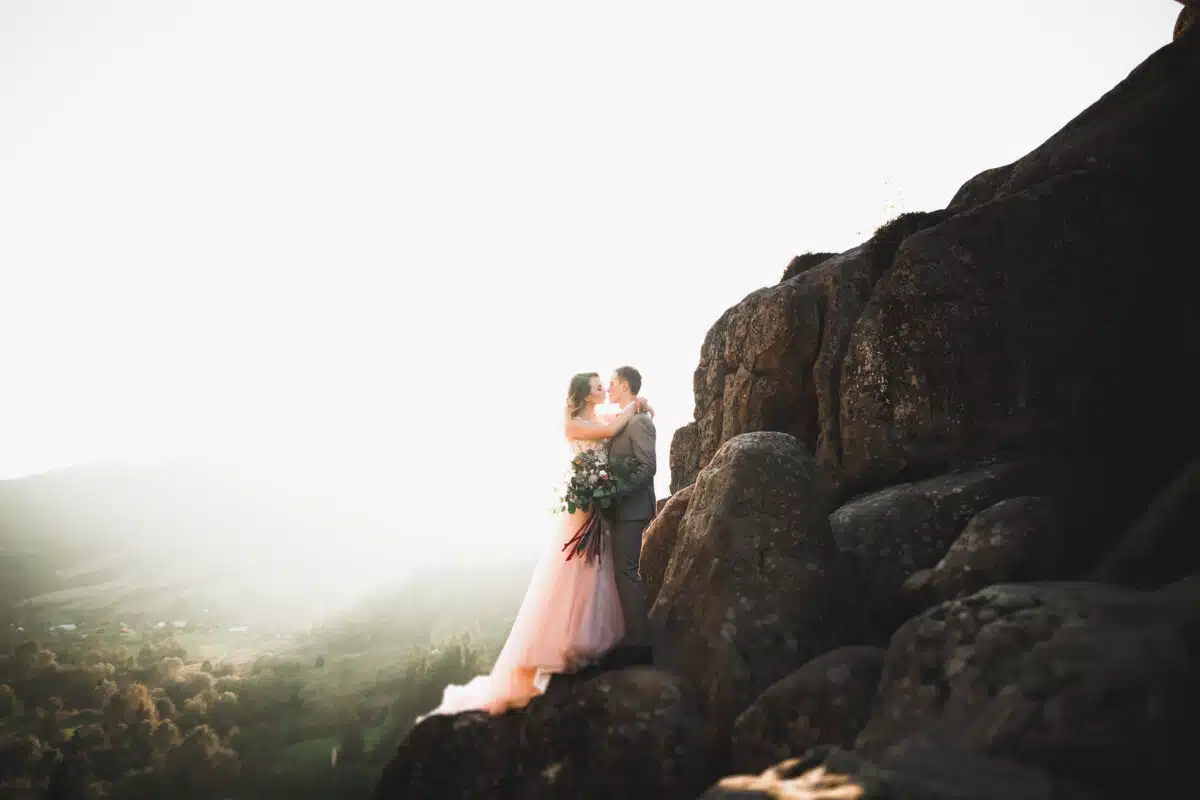
“A Maiden’s Ideal of a Husband” by Henry Carey
Genteel in personage,
Conduct, and equipage,
Noble by heritage,
Generous and free:
Brave, not romantic;
Learned, not pedantic;
Frolic, not frantic;
This must he be.
Honor maintaining,
Meanness disdaining,
Still entertaining.
Engaging and new.
Neat, but not finical;
Sage, but not cynical;
Never tyrannical,
But ever true.
“A Red, Red Rose” by Robert Burns
Oн, my luve’s like a red, red rose,
That’s newly sprung in June!
Oh, my luve’s like the melodie
That’s sweetly play’d in tune!
As fair art thou, my bonnie lass,
So deep in luve am I;
And I will luve thee still, my dear,
Till a’ the seas gang dry.
Till a’ the seas gang dry, my dear,
And the rocks melt wi’ the sun,
And I will luve thee still , my dear,
While the sands o’ life shall run.
And fare thee weel, my only luve!
And fare thee weel awhile!
And I will come again, my luve,
Tho’ it were ten thousand mile.
“Faith and Hope” by Rembrandt Peale
O, don’t be sorrowful, darling!
Now, don’t be sorrowful, pray;
For, taking the year together, my dear,
There isn’t more night than day.
It ’s rainy weather, my loved one;
Time’s wheels they heavily run;
But taking the year together, my dear,
There isn’t more cloud than sun.
We ’re old folks now, companion,—
Our heads they are growing gray;
But taking the year all round, my dear,
You always will find the May.
We ’ve had our May, my darling,
And our roses, long ago;
And the time of the year is come, my dear,
For the long dark nights, and the snow.
But God is God, my faithful,
Of night as well as of day;
And we feel and know that we can go
Wherever he leads the way.
Ay, God of night, my darling!
Of the night of death so grim;
And the gate that from life leads out, good wife,
Is the gate that leads to Him.
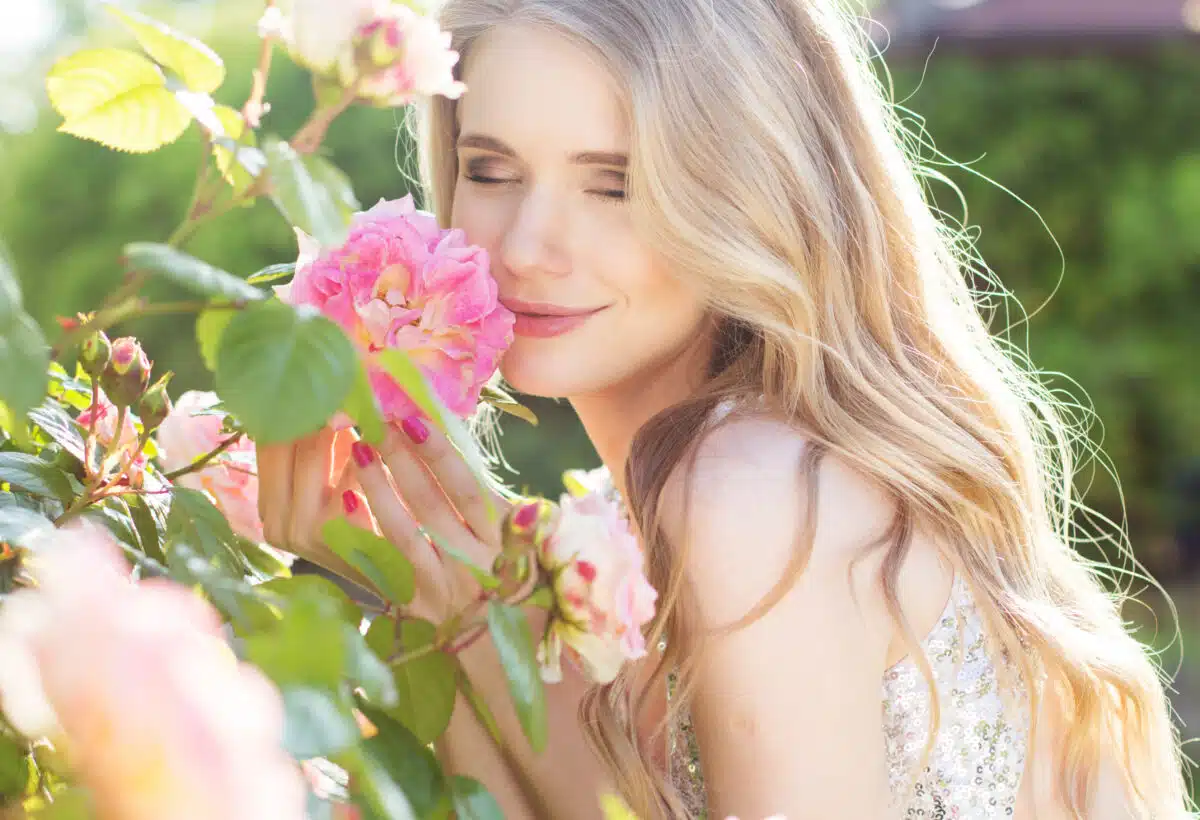
“Ever Faithful to You” by Lucian B. Watkins
When e’er I read these words, Dear Heart, of your sweet valentine,
I’m sure no heart can ever feel a sweeter joy than mine.
“Faithful!” no word can e’er express a truer, greater love—
No truer constancy than this have angels up above!
“Ever!” ah, then eternally you pledge that you’ll be true!
For love’s sweet sake, alone, I choose a happy life with you.
Through every sorrow, joy or pain that we in life may meet,
In sweet companionship we’ll share—the bitter with the sweet.
We’ll live with these words of faithfulness, what e’er our lot may be.
And live that we may after death from earthly stains be free.
Wedding Poems For Bride and Groom

“Wedding Bells” by Eliza Cook
Twilight shade is calmly falling
Round about the dew-robed flowers;
Philomel’s lone song is calling
Lovers to their fairy bowers;
Echo, on the zephyrs gliding,
Bears a voice that seems to say,
“Ears and hearts, come, list my tiding,
This has been a wedding-day.”
Hark! the merry chimes are pealing,
Soft and glad the music swells;
Gaily on the night-wind stealing,
Sweetly sound the wedding bells.
Every simple breast rejoices;
Laughter rides upon the gale;
Happy hearts and happy voices
Dwell within the lowly vale.
Oh, how sweet, on zephyrs gliding,
Sound the bells that seem to say,
“Ears and hearts, come, list my tiding,
This has been a wedding-day.”
Hark! the merry chimes are pealing,
Soft and glad the music swells;
Gaily on the night-wind stealing,
Sweetly sound the wedding bells.
“Marriage Morning” by Alfred Lord Tennyson
Light, so low upon earth,
You send a flash to the sun.
Here is the golden close of love,
All my wooing is done.
O all the woods and the meadows,
Woods where we hid from the wet,
Stiles where we stay’d to be kind,
Meadows in which we met!
Light, so low in the vale
You flash and lighten afar:
For this is the golden morning of love,
And you are his morning star.
Flash, I am coming, I come,
By meadow and stile and wood:
Oh, lighten into my eyes and my heart,
Into my heart and my blood!
Heart, are you great enough
For a love that never tires?
O heart, are you great enough for love?
I have heard of thorns and briers.
Over the thorns and briers,
Over the meadows and stiles,
Over the world to the end of it
Flash of a million miles.
“The Wedding Night” by Johann Wolfgang von Goethe (John Storer Cobb, Samuel Taylor Coleridge, Translators)
Within the chamber, far away
From the glad feast, sits love in dread
Lest guests disturb, in wanton play,
The silence of the bridal bed.
His torch’s pale flame serves to gild
The scene with mystic sacred glow,
The room with incense -clouds is filled,
That he may perfect rapture know .
How beats thy heart, when thou dost hear
The chimes that warn thy guests to fly?
How glow’st thou for those lips so dear,
That soon are mute, and nought deny!
With her into the holy place
Thou hast’nest then to perfect all;
The fire the warder’s hands embrace,
Grows, like a night- light, dim and small.
How heaves the bosom, and how burns
Her face at every fervent kiss!
Her coldness now to trembling turns,
Thy daring now a duty is.
Love helps thee to undress her fast,
But thou art twice as fast as he;
And then he shuts both eyes at last
With sly and roguish modesty.
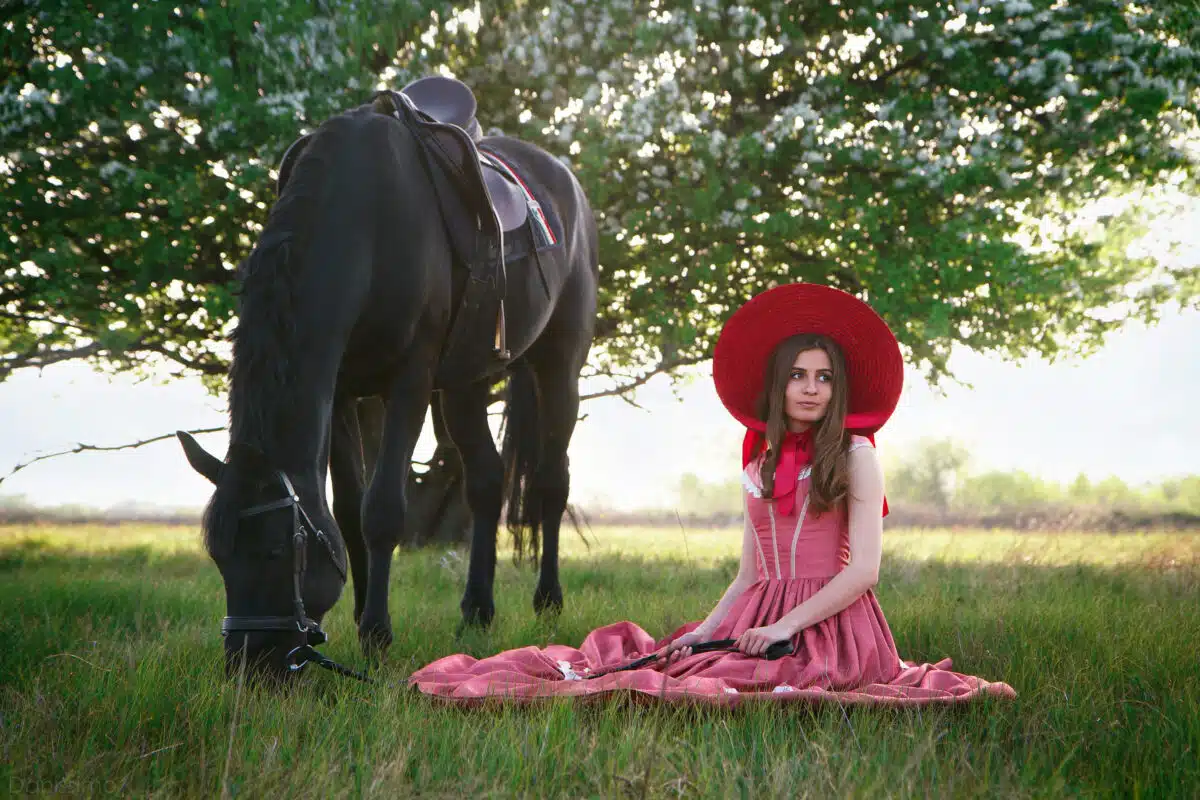
“To My Dear and Loving Husband” by Anne Bradstreet
If ever two were one, then surely we.
If ever man were loved by wife, then thee;
If ever wife was happy in a man,
Compare with me ye women if you can.
I prize thy love more than whole mines of gold,
Or all the riches that the East doth hold.
My love is such that rivers cannot quench,
Nor ought but love from thee give recompense.
Thy love is such I can no way repay;
The heavens reward thee manifold, I pray.
Then while we live, in love let’s so persever,
That when we live no more we may live ever.
“In the Heart of a Rose” by George Marion McClellan
I will hide my soul and its mighty love
In the bosom of this rose,
And its dispensing breath will take
My love wherever it goes.
And perhaps she’ll pluck this very rose,
And, quick as blushes start,
Will breathe my hidden secret in
Her unsuspecting heart.
And there I will live in her embrace
And the realm of sweetness there,
Enamored with an ecstasy,
Of bliss beyond compare.
“Love” by Victor James Daley
Love is the sunlight of the soul,
That, shining on the silken-tressèd head
Of her we love, around it seems to shed
A golden angel-aureole.
And all her ways seem sweeter ways
Than those of other women in that light:
She has no portion with the pallid night,
But is a part of all fair days.
Joy goes where she goes, and good dreams-
Her smile is tender as an old romance
Of Love that dies not, and her soft eye-s glance
Like sunshine set to music seems.
Queen of our fate is she, but crowned
With purple hearts-ease for her womanhood.
There is no place so poor where she has stood
But evermore is holy ground.
An angel from the heaven above
Would not be fair to us as she is fair:
She holds us in a mesh of silken hair,
This one sweet woman whom we love.
We pray thee, Love, our souls to steep
In dreams wherein thy myrtle flowereth;
So when the rose leaves shiver, feeling Death
Pass by, we may remain asleep:
Asleep, with poppies in our hands,
From all the world and all its cares apart-
Cheek close to cheek, heart beating against heart,
While through Life-s sandglass run the sands.

“Song” by Richard Le Gallienne
My eye upon your eyes –
So was I born,
One far-off day in Paradise,
A summer morn;
I had not lived till then,
But, wildered, went,
Like other wandering men,
Nor what Life meant
Knew I till then.
My hand within your hand –
So would I live,
Nor would I ask to understand
Why God did give
Your loveliness to me,
But I would pray
Worthier of it to be,
By night and day,
Unworthy me!
My heart upon your heart –
So would I die,
I cannot think that God will part
Us, you and I;
The work he did undo,
That summer morn;
I lived, and would die too,
Where I was born,
Beloved, in you.
“Wild Nights—Wild Nights!” by Emily Dickinson
Wild Nights – Wild Nights!
Were I with thee
Wild Nights should be
Our luxury!
Futile – the winds –
To a heart in port –
Done with the compass –
Done with the chart!
Rowing in Eden –
Ah, the sea!
Might I moor – Tonight –
In thee!
“Love at Sea” by Algernon Charles Swinburne
We are in love’s land to-day;
Where shall we go?
Love, shall we start or stay,
Or sail or row?
There ’s many a wind and way,
And never a May but May;
We are in love’s hand to-day;
Where shall we go?
Our landwind is the breath
Of sorrows kiss’d to death
And joys that were;
Our ballast is a rose;
Our way lies where God knows
And love knows where.
We are in love’s hand to-day—
Our seamen are fledged Loves,
Our masts are bills of doves,
Our decks fine gold;
Our ropes are dead maids’ hair,
Our stores are love-shafts fair
And manifold.
We are in love’s land to-day—
Where shall we land you, sweet?
On fields of strange men’s feet,
Or fields near home?
Or where the fire-flowers blow,
Or where the flowers of snow
Or flowers of foam?
We are in love’s hand to-day—
Land me, she says, where love
Shows but one shaft, one dove,
One heart, one hand,—
A shore like that, my dear,
Lies where no man will steer,
No maiden land.
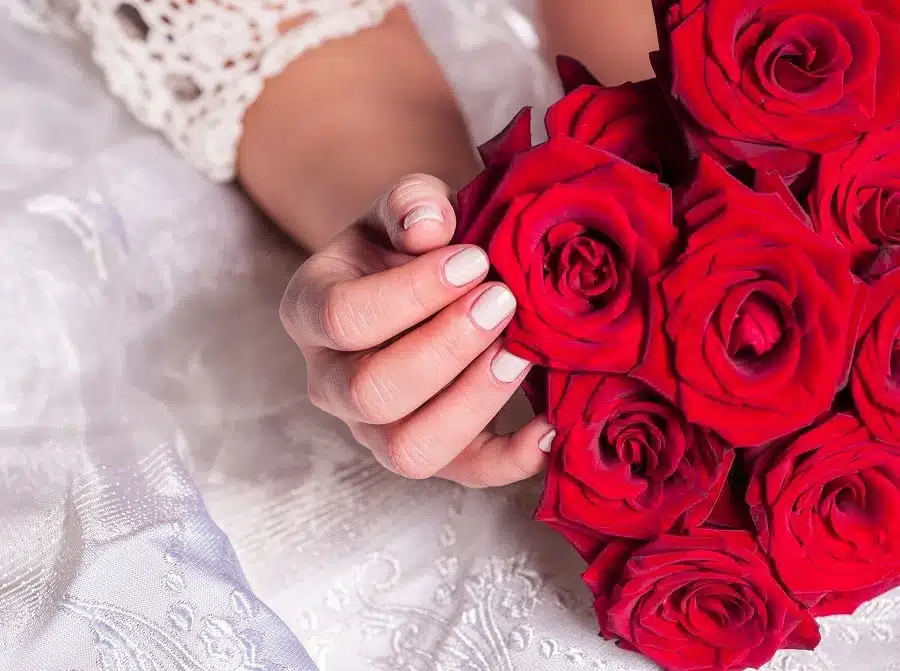
“Love’s Rose” by Percy Bysshe Shelley
I.
Hopes, that swell in youthful breasts,
Live not through the waste of time!
Love-s rose a host of thorns invests;
Cold, ungenial is the clime,
Where its honours blow.
Youth says, -The purple flowers are mine,-
Which die the while they glow.
II.
Dear the boon to Fancy given,
Retracted whilst it-s granted:
Sweet the rose which lives in Heaven,
Although on earth -tis planted,
Where its honours blow,
While by earth-s slaves the leaves are riven
Which die the while they glow.
III.
Age cannot Love destroy,
But perfidy can blast the flower,
Even when in most unwary hour
It blooms in Fancy-s bower.
Age cannot Love destroy,
But perfidy can rend the shrine
In which its vermeil splendours shine.
“To O. E. A.” by Claude McKay
Your voice is the color of a robin’s breast,
And there’s a sweet sob in it like rain—still rain in the night.
Among the leaves of the trumpet-tree, close to his nest,
The pea-dove sings, and each note thrills me with strange delight
Like the words, wet with music, that well from your trembling throat.
I’m afraid of your eyes, they’re so bold,
Searching me through, reading my thoughts, shining like gold.
But sometimes they are gentle and soft like the dew on the lips of the eucharis
Before the sun comes warm with his lover’s kiss,
You are sea-foam, pure with the star’s loveliness,
Not mortal, a flower, a fairy, too fair for the beauty-shorn earth,
All wonderful things, all beautiful things, gave of their wealth to your birth:
O I love you so much, not recking of passion, that I feel it is wrong,
But men will love you, flower, fairy, non-mortal spirit burdened with flesh,
Forever, life-long.
“Ask Me Why I Love You” by Walter Everette Hawkins
Ask me why I love you, dear,
And I will ask the rose
Why it loves the dews of Spring
At the Winter’s close;
Why the blossoms’ nectared sweets
Loved by questing bee,—
I will gladly answer you,
If they answer me.
Ask me why I love you, dear,
And I will ask the flower
Why it loves the Summer sun,
Or the Summer shower;
I will ask the lover’s heart
Why it loves the moon,
Or the star-besprinkled skies
In a night in June.
Ask me why I love you, dear,
I will ask the vine
Why its tendrils trustingly
Round the oak entwine;
Why you love the mignonette
Better than the rue,—
If you will but answer me,
I will answer you.
Ask me why I love you, dear,
Let the lark reply,
Why his heart is full of song
When the twilight’s nigh;
Why the lover heaves a sigh
When her heart is true;
If you will but answer me,
I will answer you.

“This Much and More” by Djuna Barnes
If my lover were a comet
Hung in air,
I would braid my leaping body
In his hair.
Yea, if they buried him ten leagues
Beneath the loam,
My fingers they would learn to dig
And I’d plunge home!
“Evening Song” by Willa Cather
Dear love, what thing of all the things that be
Is ever worth one thought from you or me,
Save only Love,
Save only Love?
The days so short, the nights so quick to flee,
The world so wide, so deep and dark the sea,
So dark the sea;
So far the suns and every listless star,
Beyond their light—Ah! dear, who knows how far,
Who knows how far?
One thing of all dim things I know is true,
The heart within me knows, and tells it you,
And tells it you.
So blind is life, so long at last is sleep,
And none but Love to bid us laugh or weep,
And none but Love,
And none but Love.
“Serenade” by Djuna Barnes
Three paces down the shore, low sounds the lute,
The better that my longing you may know;
I’m not asking you to come,
But—can’t you go?
Three words, “I love you,” and the whole is said—
The greatness of it throbs from sun to sun;
I’m not asking you to walk,
But—can’t you run?
Three paces in the moonlight’s glow I stand,
And here within the twilight beats my heart.
I’m not asking you to finish,
But—to start.

“My Wife” by Robert Louis Stevenson
Trusty, dusky, vivid, true,
With eyes of gold and bramble-dew,
Steel-true and blade-straight,
The great artificer
Made my mate.
Honour, anger, valour, fire;
A love that life could never tire,
Death quench or evil stir,
The mighty master
Gave to her.
Teacher, tender, comrade, wife,
A fellow-farer true through life,
Heart-whole and soul-free
The august father
Gave to me.
“The Maidens Came” by Anonymous
The maidens came
When I was in my mother’s bower;
I had all that I would.
The bailey beareth the bell away;
The lily, the rose, the rose I lay.
The silver is white, red is the gold;
The robes they lay in fold.
The bailey beareth the bell away;
The lily, the rose, the rose I lay.
And through the glass window shines the sun.
How could I love and I so young?
The bailey beareth the bell away;
The lily, the rose, the rose I lay.
“Love’s Arithmetic” by Richard Le Gallienne
You often ask me, love, how much I love you,
Bidding my fancy find
An answer to your mind;
I say: ‘Past count, as there are stars above you.’
You shake your head and say,
‘Many and bright are they,
But that is not enough.’
Again I try:
‘If all the leaves on all the trees
Were counted over,
And all the waves on all the seas,
More times your lover,
Yea! more than twice ten thousand times am I.’
”Tis not enough,’ again you make reply.
‘How many blades of grass,’ one day I said,
‘Are there from here to China? how many bees
Have gathered honey through the centuries?
Tell me how many roses have bloomed red
Since the first rose till this rose in your hair?
How many butterflies are born each year?
How many raindrops are there in a shower?
How many kisses, darling, in an hour?’
Thereat you smiled, and shook your golden head;
‘Ah! not enough!’ you said.
Then said I: ‘Dear, it is not in my power
To tell how much, how many ways, my love;
Unnumbered are its ways even as all these,
Nor any depth so deep, nor height above,
May match therewith of any stars or seas.’
‘I would hear more,’ you smiled . . .
‘Then, love,’ I said,
‘This will I do: unbind me all this gold
Too heavy for your head,
And, one by one, I’ll count each shining thread,
And when the tale of all its wealth is told . . .’
‘As much as that!’ you said–
‘Then the full sum of all my love I’ll speak,
To the last unit tell the thing you ask . . .’
Thereat the gold, in gleaming torrents shed,
Fell loose adown each cheek,
Hiding you from me; I began my task.
”Twill last our lives,’ you said.
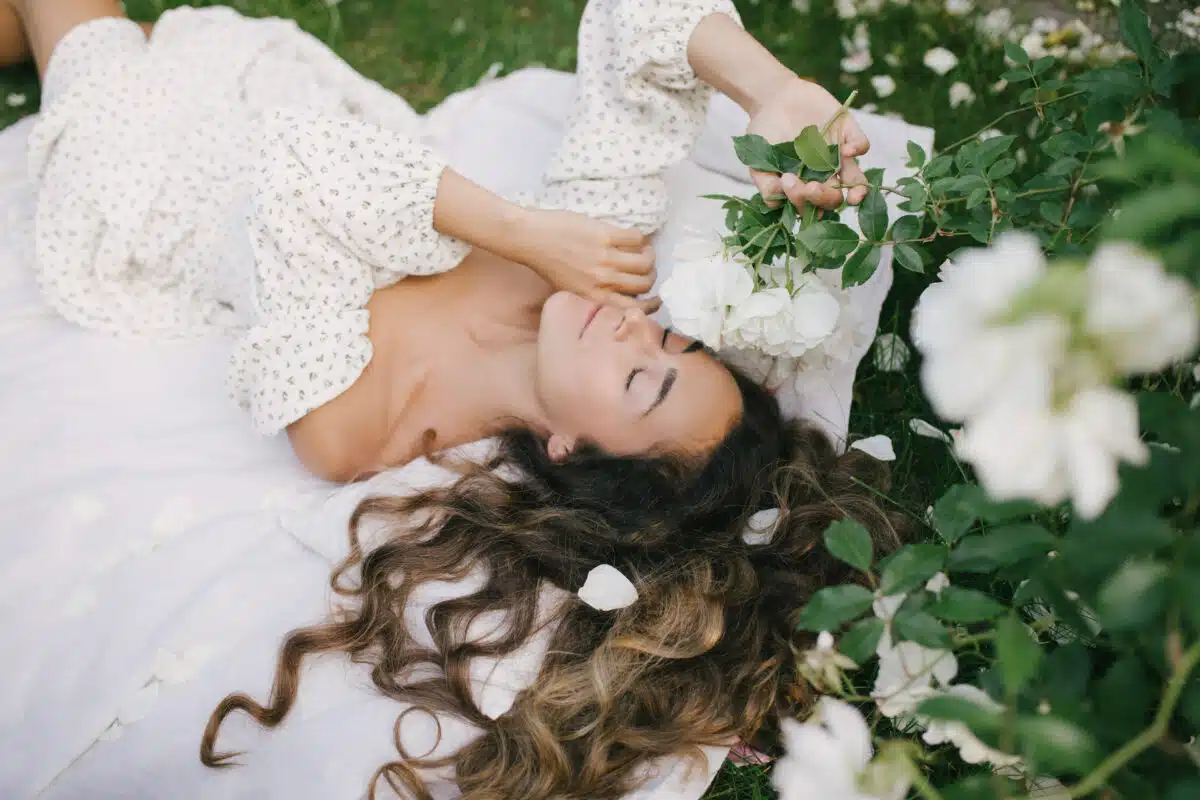
“To My Wife” by Alexander Posey
I’ve seen the beauty of the rose,
I’ve heard the music of the bird,
And given voice to my delight;
I’ve sought the shapes that come in dreams,
I’ve reached my hands in eager quest,
To fold them empty to my breast;
While you, the whole of all I’ve sought—
The love, the beauty, and the dreams—
Have stood, thro’ weal and woe, true at
My side, silent at my neglect.
Rhyming Wedding Poems
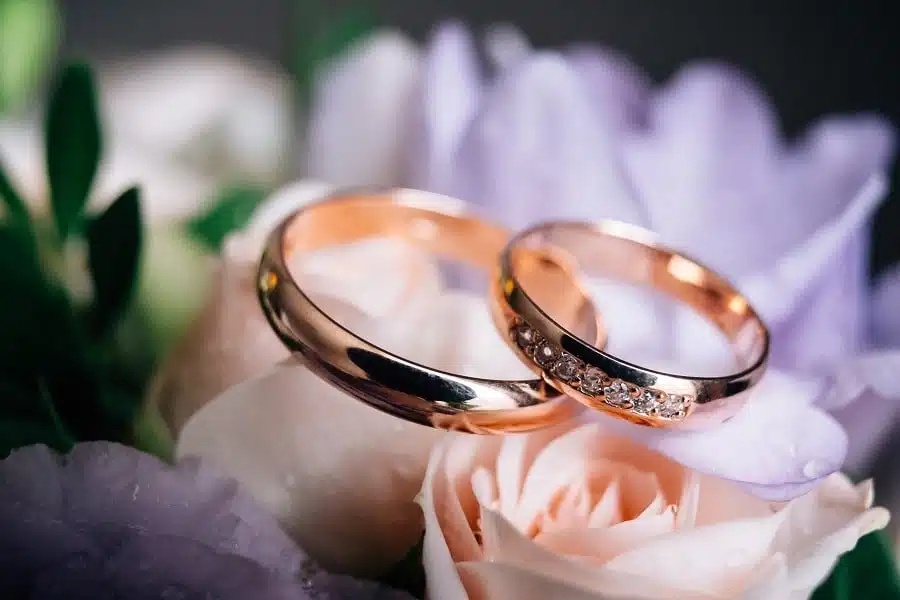
“A Wedding Sonnet” by James Berry Bensel
It were an idle thing, good friends, to say
No after grief be yours! The rose may blow
In beauty, but the thorn as well must grow;
And though a brilliant sun brings in the day,
Lo, a small cloud,—a hair-breadth’s size, we ’ll say—
May spread until it hides the splendid glow.
Then let me pray these for you as you go:
Sweet Patience, calm Content, and all the way
You travel, white robed Peace: then at your side,
When Grief shall come she will come silently
And powerless to harm. Ay: you will take
Her hand submissively, and bid her bide
At will within your walls. So you may be
Happy and glad with Grief for Love’s dear sake.
“Bridal Song” by George Chapman
O come, soft rest of cares! come, Night!
Come, naked Virtue’s only tire,
The reapèd harvest of the light
Bound up in sheaves of sacred fire.
Love calls to war:
Sighs his alarms,
Lips his swords are,
The field his arms.
Come, Night, and lay thy velvet hand
On glorious Day’s outfacing face;
And all thy crownèd flames command
For torches to our nuptial grace.
Love calls to war:
Sighs his alarms,
Lips his swords are,
The field his arms.
“A Husband’s Homily” by Clemente Bondi (James Glassford, Translator)
She whom you loved and chose, is now your bride,
The gift of heaven, and to your trust consigned;
Honour her still, though not with passion blind;
And in her virtue, though you watch, confide.
Be to her youth a comfort, guardian, guide,
In whose experience she may safety find;
And whether sweet or bitter be assigned,
The joy with her, as well as pain, divide.
Yield not too much if reason disapprove;
Nor too much force; the partner of your life
Should neither victim be, nor tyrant prove.
Thus shall that rein, which often mars the bliss
Of wedlock, scarce be felt; and thus your wife
Ne’er in the husband shall the lover miss.
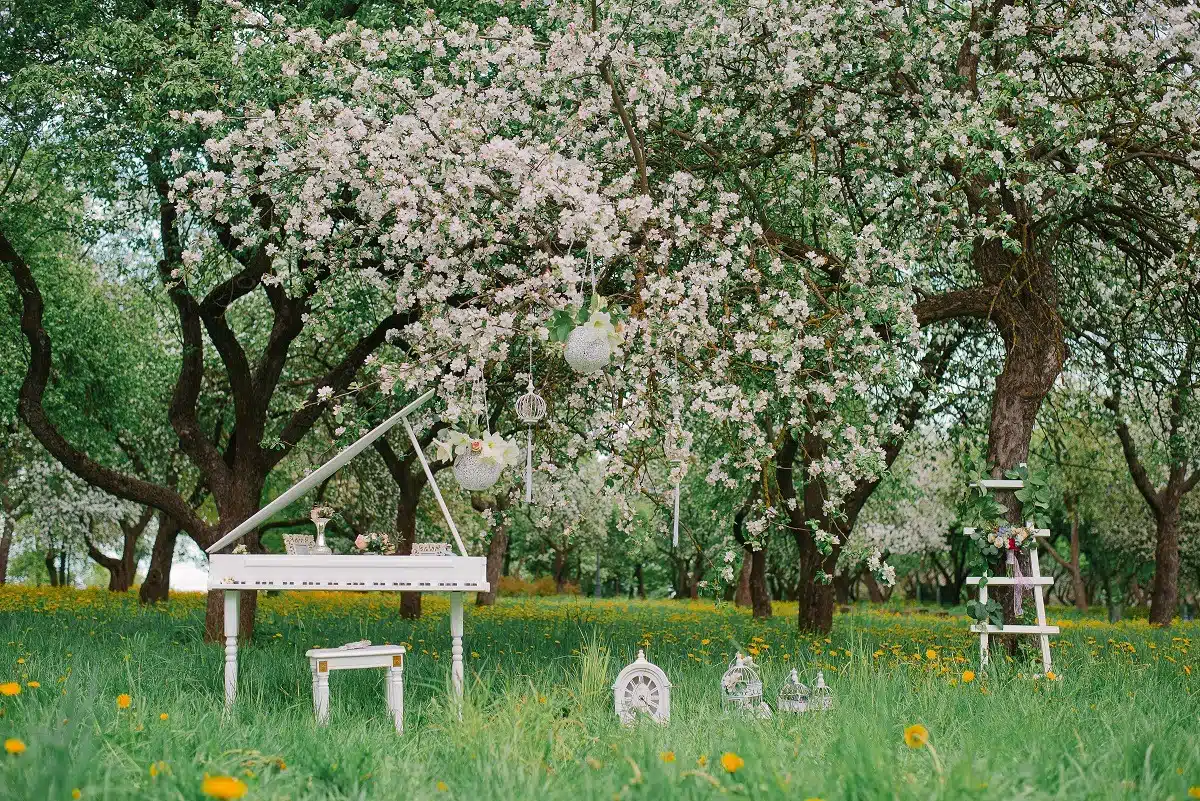
“My Songs Are All of Thee” by Richard Watson Gilder
My songs are all of thee, what though I sing
Of morning when the stars are yet in sight,
Of evening, or the melancholy night,
Of birds that o’er the reddening waters wing;
Of song, of fire, of winds, or mists that cling
To mountain-tops, of winter all in white,
Of rivers that toward ocean take their flight,
Of summer when the rose is blossoming.
I think no thought that is not thine, no breath
Of life I breathe beyond thy sanctity;
Thou art the voice that silence uttereth,
And of all sound thou art the sense. From thee
The music of my song, and what it saith
Is but the beat of thy heart, throbbed through me.
“My Lady’s Presence Makes the Roses Red” by Henry Constable
My Lady’s presence makes the Roses red,
Because to see her lips they blush for shame.
The Lily’s leaves, for envy, pale became;
And her white hands in them this envy bred.
The Marigold the leaves abroad doth spread;
Because the sun’s and her power is the same.
The Violet of purple colour came,
Dyed in the blood she made my heart to shed.
In brief. All flowers from her their virtue take;
From her sweet breath, their sweet smells do proceed;
The living heat which her eyebeams doth make
Warmeth the ground, and quickeneth the seed.
The rain, wherewith she watereth the flowers,
Falls from mine eyes, which she dissolves in showers.
“Eternal” by Carlotta Perry
Love is eternal, so the strong souls say,
But seeing how hard life doth give the lie
Unto the mighty words, with sneer or sigh,
The weaker ones cry out in sad dismay
That love is changeful as an April day,
Holding within itself no strength whereby
It can the subtle shafts of time defy,
And in the heart of man abide alway.
Not every heart is great enough to hold
A great immortal tenant. Love hath fled
Always from natures narrow, weak and cold.
Know, when by scornful lips you hear it said
That Love is traitor, that the truth is told
Not of dear Love, but of that soul instead.
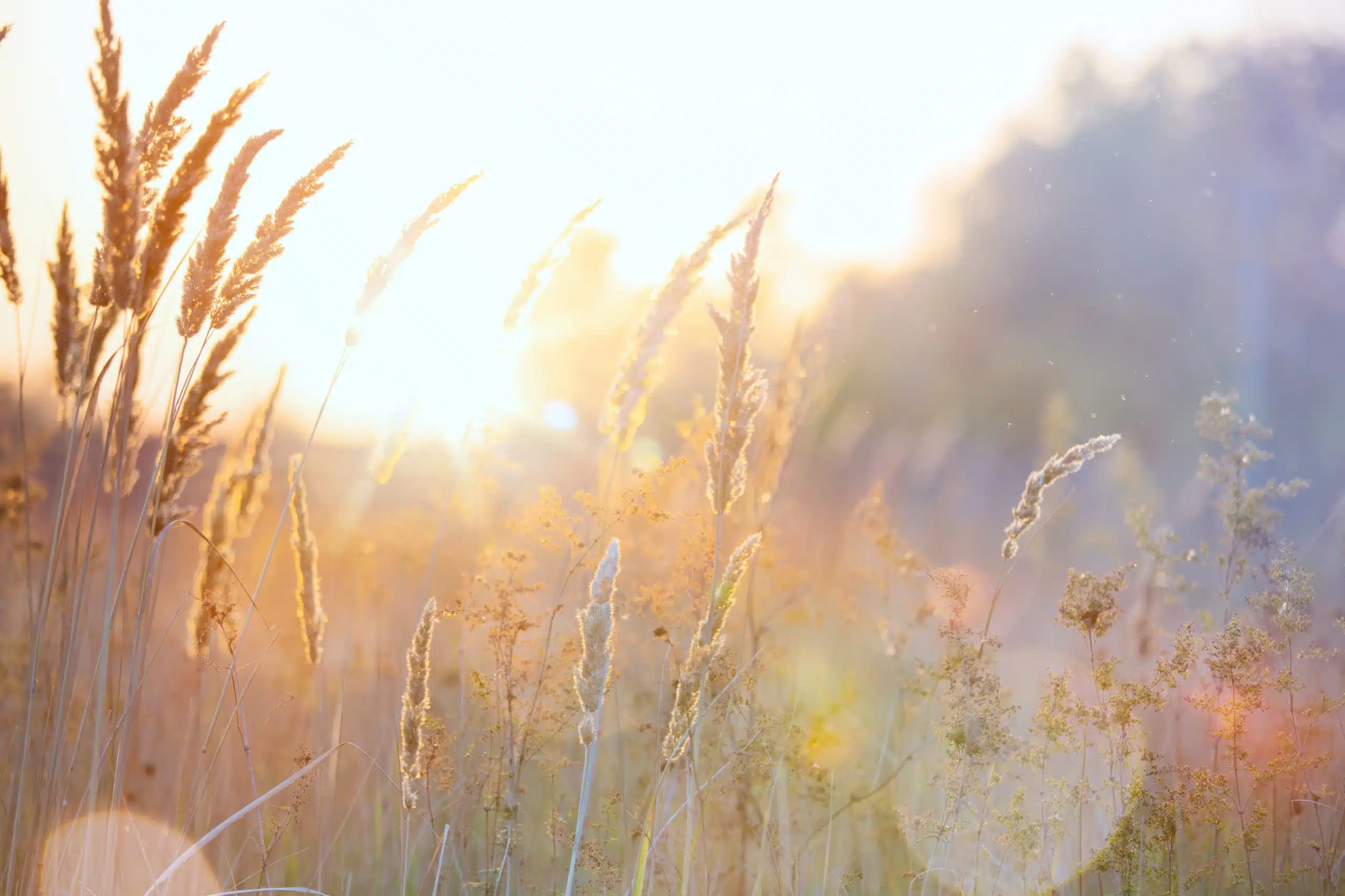
“Love’s Fidelity” by Francesco Petrarca (Earl of Surrey, Translator)
Set me whereas the sun doth parch the green,
Or where his beams do not dissolve the ice:
In temperate heat, where he is felt and seen;
In presence prest of people mad or wise;
Set me in high, or yet in low degree;
In longest night, or in the shortest day;
In clearest sky, or where clouds thickest be;
In lusty youth, or when my hairs are grey:
Set me in heaven, in earth, or else in hell,
In hill or dale, or in the foaming flood;
Thrall, or at large, alive whereso I dwell,
Sick or in health, in evil fame or good,
Hers will I be; and only with this thought
Content myself although my chance be nought.
“She Walks in Beauty” by George Gordon Byron, Lord Byron
She walks in beauty, like the night
Of cloudless climes and starry skies;
And all that ‘s best of dark and bright
Meet in her aspect and her eyes:
Thus mellow’d to that tender light
Which heaven to gaudy day denies.
One shade the more, one ray the less,
Had half impair’d the nameless grace
Which waves in every raven tress,
Or softly lightens o’er her face;
Where thoughts serenely sweet express
How pure, how dear their dwelling-place.
And on that cheek, and o’er that brow,
So soft, so calm, yet eloquent,
The smiles that win, the tints that glow,
But tell of days in goodness spent,
A mind at peace with all below,
A heart whose love is innocent!
“The Indian Serenade” by Percy Bysshe Shelley
I arise from dreams of thee
In the first sweet sleep of night,
When the winds are breathing low,
And the stars are shining bright.
I arise from dreams of thee,
And a spirit in my feet
Hath led me -who knows how?
To the chamber window, sweet!
The wandering airs they faint
On the dark, the silent stream
The champak odors fail
Like sweet thoughts in a dream ;
The nightingale’s complaint
It dies upon her heart,
As I must die on thine,
Beloved as thou art!
Oh, lift me from the grass!
I die , I faint, I fail!
Let thy love in kisses rain
On my lips and eyelids pale.
My cheek is cold and white, alas!
My heart beats loud and fast:
Oh! press it close to thine again,
Where it will break at last.
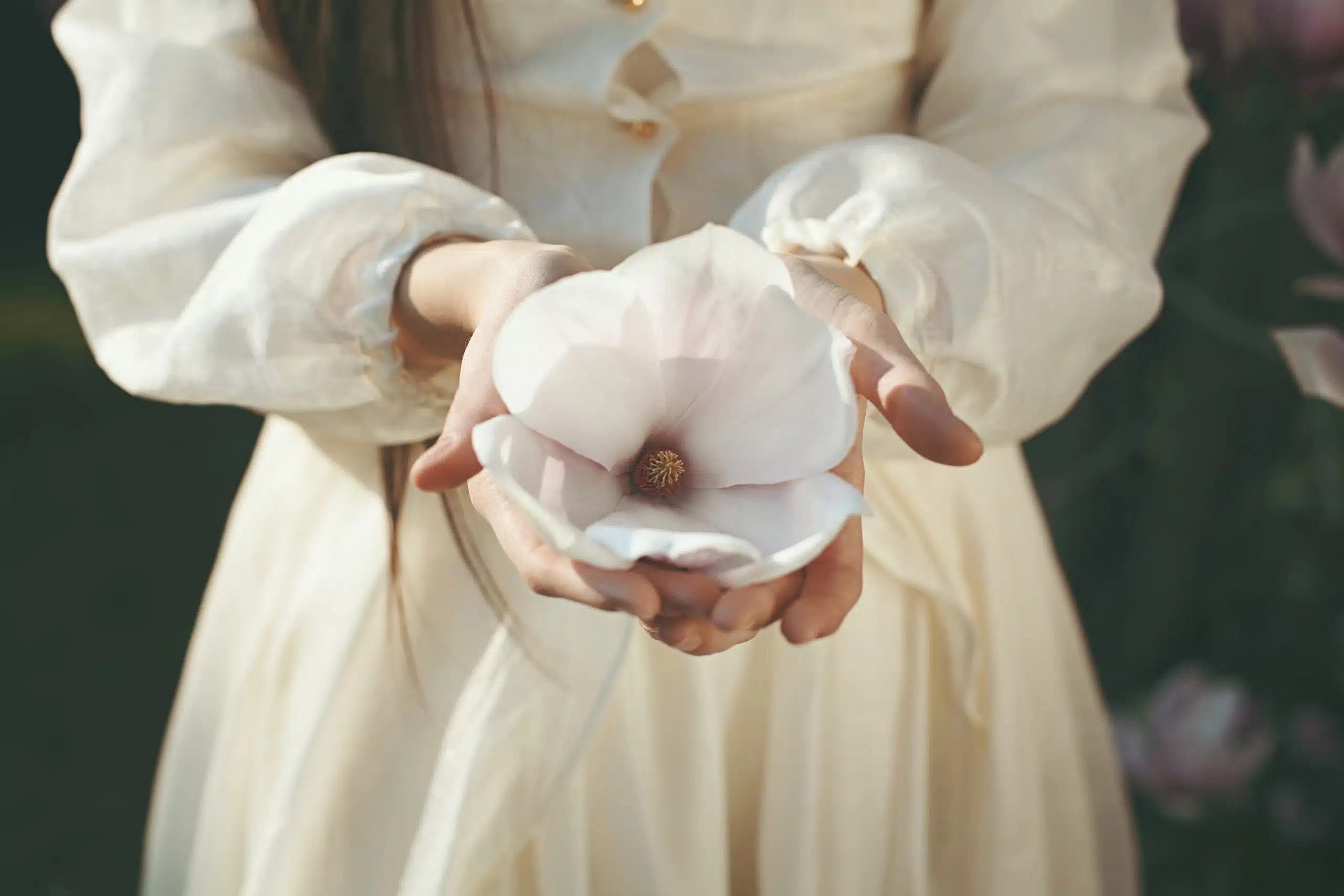
“Love, the Light-Giver by Michelangelo” (John Addington Symonds, Translator)
With your fair eyes a charming light I see,
For which my own blind eyes would peer in vain;
Stayed by your feet the burden I sustain
Which my lame feet find all too strong for me;
Wingless upon your pinions forth I fly;
Heavenward your spirit stirreth me to strain;
E’en as you will, I blush and blanch again,
Freeze in the sun, burn ’neath a frosty sky.
Your will includes and is the lord of mine;
Life to my thoughts within your heart is given;
My words begin to breathe upon your breath:
Like to the moon am I, that cannot shine
Alone; for lo! our eyes see nought in heaven
Save what the living sun illumineth.
“Romance” by Robert Louis Stevenson
I will make you brooches and toys for your delight
Of bird-song at morning and star-shine at night.
I will make a palace fit for you and me,
Of green days in forests and blue days at sea.
I will make my kitchen, and you shall keep your room,
Where white flows the river and bright blows the broom,
And you shall wash your linen and keep your body white
In rainfall at morning and dewfall at night.
And this shall be for music when no one else is near,
The fine song for singing, the rare song to hear!
That only I remember, that only you admire,
Of the broad road that stretches and the roadside fire.
“Since First I Saw Your Face” by Anonymous
Since first I saw your face I resolved to honour and renown ye;
If now I be disdainèd I wish my heart had never known ye.
What? I that loved and you that liked, shall we begin to wrangle?
No, no, no, my heart is fast, and cannot disentangle.
If I admire or praise you too much, that fault you may forgive me;
Or if my hands had stray’d but a touch, then justly might you leave me.
I ask’d you leave, you bade me love; is ‘t now a time to chide me?
No, no, no, I’ll love you still what fortune e’er betide me.
The Sun, whose beams most glorious are, rejecteth no beholder,
And your sweet beauty past compare made my poor eyes the bolder:
Where beauty moves and wit delights and signs of kindness bind me,
There, O there! where’er I go I’ll leave my heart behind me!

“Perfect Woman” by William Wordsworth
She was a phantom of delight
When first she gleam’d upon my sight;
A lovely apparition, sent
To be a moment’s ornament;
Her eyes as stars of twilight fair;
Like twilight’s, too, her dusky hair;
But all things else about her drawn
From May-time and the cheerful dawn;
A dancing shape, an image gay,
To haunt, to startle, and waylay.
I saw her upon nearer view,
A Spirit, yet a Woman too!
Her household motions light and free,
And steps of virgin liberty;
A countenance in which did meet
Sweet records, promises as sweet;
A creature not too bright or good
For human nature’s daily food;
For transient sorrows, simple wiles,
Praise, blame, love, kisses, tears, and smiles.
And now I see with eye serene
The very pulse of the machine;
A being breathing thoughtful breath,
A traveller between life and death;
The reason firm, the temperate will,
Endurance, foresight, strength, and skill;
A perfect Woman, nobly plann’d,
To warn, to comfort, and command;
And yet a Spirit still, and bright
With something of angelic light.
“Bridal Song” by John Fletcher
Cynthia, to thy power and thee
We obey.
Joy to this great company!
And no day
Come to steal this night away
Till the rites of love are ended,
And the lusty bridegroom say,
Welcome, light, of all befriended!
Pace out, you watery powers below;
Let your feet,
Like the galleys when they row,
Even beat;
Let your unknown measures, set
To the still winds, tell to all
That gods are come, immortal, great,
To honour this great nuptial!
“A True Love” by Nicholas Grimald
What sweet relief the showers to thirsty plants we see,
What dear delight the blooms to bees, my true love is to me!
As fresh and lusty Ver foul Winter doth exceed—
As morning bright, with scarlet sky, doth pass the evening’s weed—
As mellow pears above the crabs esteemèd be—
So doth my love surmount them all, whom yet I hap to see!
The oak shall olives bear, the lamb the lion fray,
The owl shall match the nightingale in tuning of her lay,
Or I my love let slip out of mine entire heart,
So deep reposèd in my breast is she for her desart!
For many blessèd gifts, O happy, happy land!
Where Mars and Pallas strive to make their glory most to stand!
Yet, land, more is thy bliss that, in this cruel age,
A Venus’ imp thou hast brought forth, so steadfast and so sage.
Among the Muses Nine a tenth if Jove would make,
And to the Graces Three a fourth, her would Apollo take.
Let some for honour hunt, and hoard the massy gold:
With her so I may live and die, my weal cannot be told.
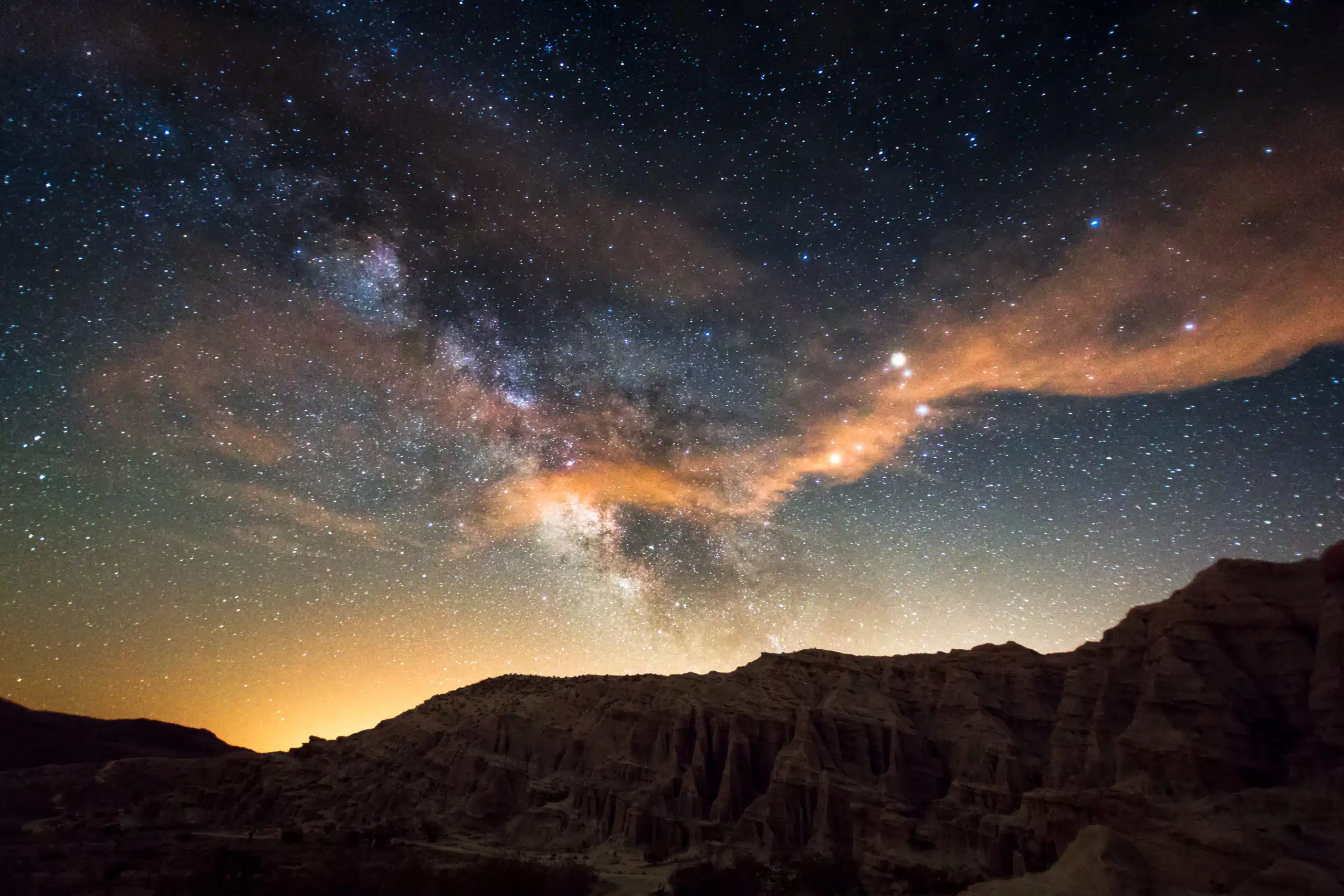
“Celestial Love” by Michelangelo (John Addington Symonds, Translator)
No mortal thing enthralled these longing eyes
When perfect peace in thy fair face I found;
But far within, where all is holy ground,
My soul felt Love, her comrade of the skies:
For she was born with God in Paradise;
Nor all the shows of beauty shed around
This fair false world her wings to earth have bound:
Unto the Love of Loves aloft she flies.
Nay, things that suffer death, quench not the fire
Of deathless spirits; nor eternity
Serves sordid Time, that withers all things rare.
Not love but lawless impulse is desire:
That slays the soul; our love makes still more fair
Our friends on earth, fairer in death on high.
“Serenade” by Aubrey De Vere
Softly, O midnight Hours!
Move softly o’er the bowers
Where lies in happy sleep a girl so fair!
For ye have power, men say,
Our hearts in sleep to sway,
And cage cold fancies in a moonlight snare.
Round ivory neck and arm
Enclasp a separate charm;
Hang o’er her poised, but breathe nor sigh nor prayer:
Silently ye may smile,
But hold your breath the while,
And let the wind sweep back your cloudy hair!
Bend down your glittering urns,
Ere yet the dawn returns,
And star with dew the lawn her feet shall tread;
Upon the air rain balm,
Bid all the woods be calm,
Ambrosial dreams with healthful slumbers wed;
That so the Maiden may
With smiles your care repay,
When from her couch she lifts her golden head;
Waking with earliest birds,
Ere yet the misty herds
Leave warm ‘mid the gray grass their dusky bed.
“The Creation of My Lady” by Francesco Redi (Edmund Gosse, Translator)
That Love,—whose power and sovranty we own,
And who before all time was did beget
The sun and moon and splendid stars, and set
All lovely things to speak of Him alone,—
Late looking earthward from his supreme throne
Saw that,—although the beauty lingered yet,—
The froward heart of man did quite forget
That all this beauty from His presence shone;
Wherefore, desiring to reclaim his eyes
To heaven by some unequalled new delight,
He gave the world a treasure from the skies,
My Lady’s sacred beauty, pure and bright,
Whose body is a robe of woven light,
And fashioned in the looms of Paradise.
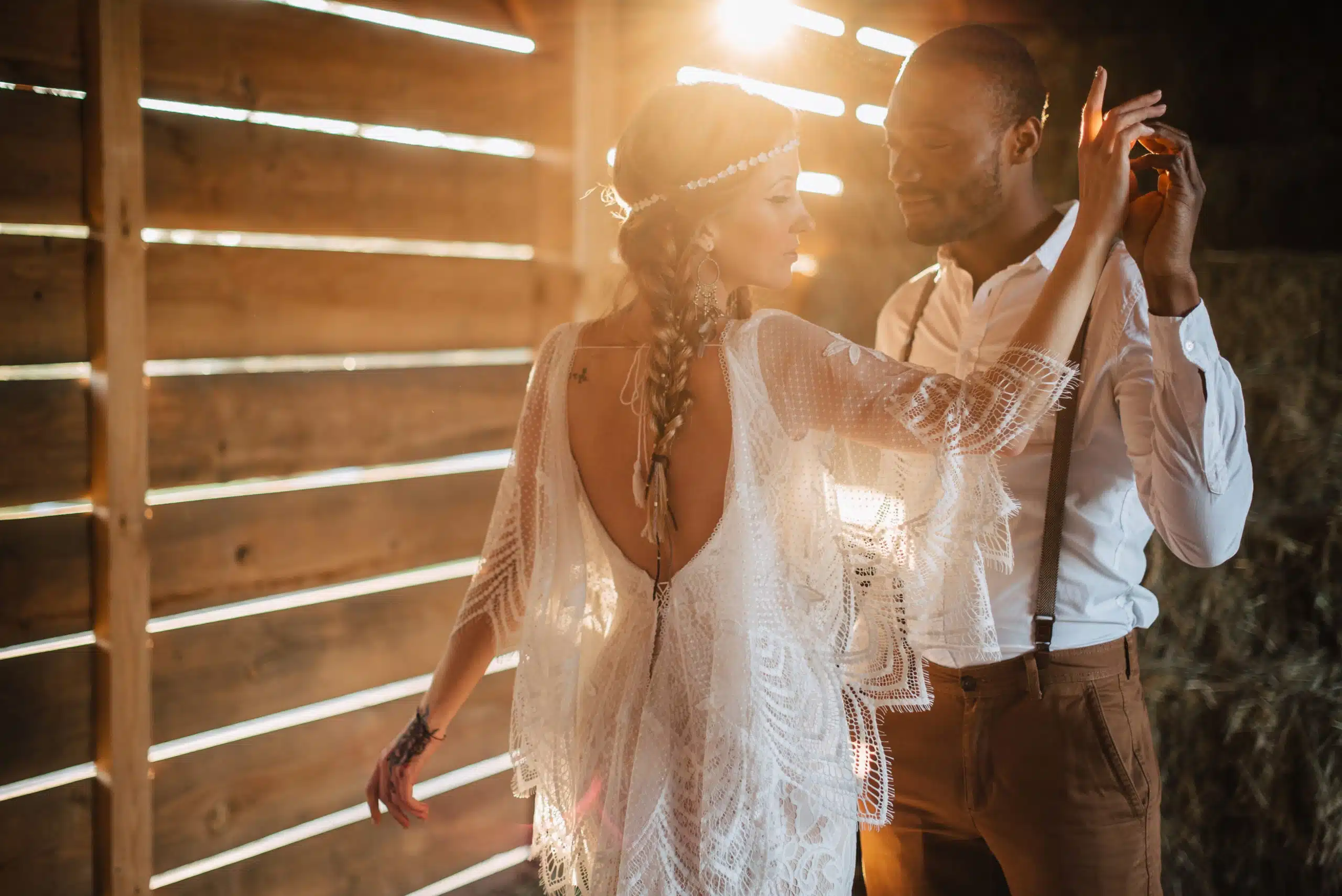
“The Sun” by Melville Madison Bigelow
Heart of the worlds! thy mighty pulses beat
Upon the furthest planet’s untrod shore;
They gild the surges of old seas that roar
Beyond man’s power to pierce their safe retreat.
Great Heart! and yet thy morning pulse-beams greet
The little rose a-tint with blushes o’er.
See! spreads his wings the youngling lark, to soar
Amid thy quickening radiance, vast but sweet.
Beat on, O Heart! on planet and on sea;
Beat on, though tuneless Silence fill thy course,—
E’en Silence fain would raise a note to thee,—
But paint the smiling flowers, and fill, O Source
Of gladsome life, the answering birds with glee,
While joy-bells in my soul ring merrily.
“Love Is but One Thing With the Gentle Heart” by Dante Alighieri (Charles Eliot Norton, Translator)
Love is but one thing with the gentle heart,
As in the saying of the sage we find.
Thus one from other cannot be apart,
More than the reason from the reasoning mind.
When Nature amorous becomes, she makes
Love then her Lord, the heart his dwelling-place,
Within which, sleeping, his repose he takes,
Sometimes for brief, sometimes for longer space.
Beauty doth then in modest dame appear
Which pleaseth so the eyes, that in the heart
A longing for the pleasing thing hath birth;
And now and then so long it lasteth there,
It makes Love’s spirit wide awake to start;
The like in lady doth a man of worth.
“Signs of Love” by Francesco Petrarca (Charles Bagot Cayley, Translator)
If amorous faith, a heart of guileless ways,
Soft languors, courteously controlled desire,
And virtuous will, kindled with noble fire,
And lengthened wanderings in a lightless maze;
If thoughts, which evermore the brow displays,
Or words that faint and brokenly suspire,
Still checked with fear and shame; if hues no higher
Than the pale violet hath, or love displays;
If holding some one than one’s self more dear,
If sorrowing and sighing evermore,
If chewing grief, and rage, and many a cross,
If burning far away, and freezing near,
Are signs that Love consumes me to the core,
Yours, lady, is the fault and mine the loss.

“A White Rose” by John Boyle O’Reilly
The red rose whispers of passion,
And the white rose breathes of love;
O the red rose is a falcon,
And the white rose is a dove.
But I send you a cream-white rosebud
With a flush on its petal tips;
For the love that is purest and sweetest
Has a kiss of desire on the lips.
“Love” by Alexandros R. Rhangabe (E. Mayhew Edmonds, Translator)
Behold, sweet love, all things on this our earth
Have been prepared with leavening of tears!
With tears, delight—with tears, renown appears,—
With mingled tears hath every joy its birth.
O’er land and sea Man passes, still at strife;
He passes—memories, footprints, leaving none:
With tears mute science following alone,
Grows old—and dies—ere he hath studied Life.
His vague desires across black chaos sail,
He hopes—his hopes untimely withering fail.
Winged shadows he pursues,—on, on, they move.
Yet creeping through the darkness gently gleams
For him th’ illumining light of one star’s beams;
One smile alone—one smile—consoles him—Love.
“Love’s Canticle” by Giovanni Cotta (James Glas, Translator)
“Cease,” the belovëd said, “oh, cease from those
Complaining sighs, fair one, and wipe the tear;
Come to my side, thy lord invites thee near,
Come reign with me, my dove, my pleasant spouse.
Winter is gone, again the damask rose,
And lily sweet, and summer buds appear,
And the loud north, which filled the flocks with fear,
And sounded through the wood, no longer blows.
The turtle’s tender voice is in the land,
And calls the shepherd to his early care
Among the vines, flitting from spray to spray.
Arise, celestial flowers for thee my hand
Hath gathered, O thou fair among the fair;
Arise, my love, my spouse, and come away.”
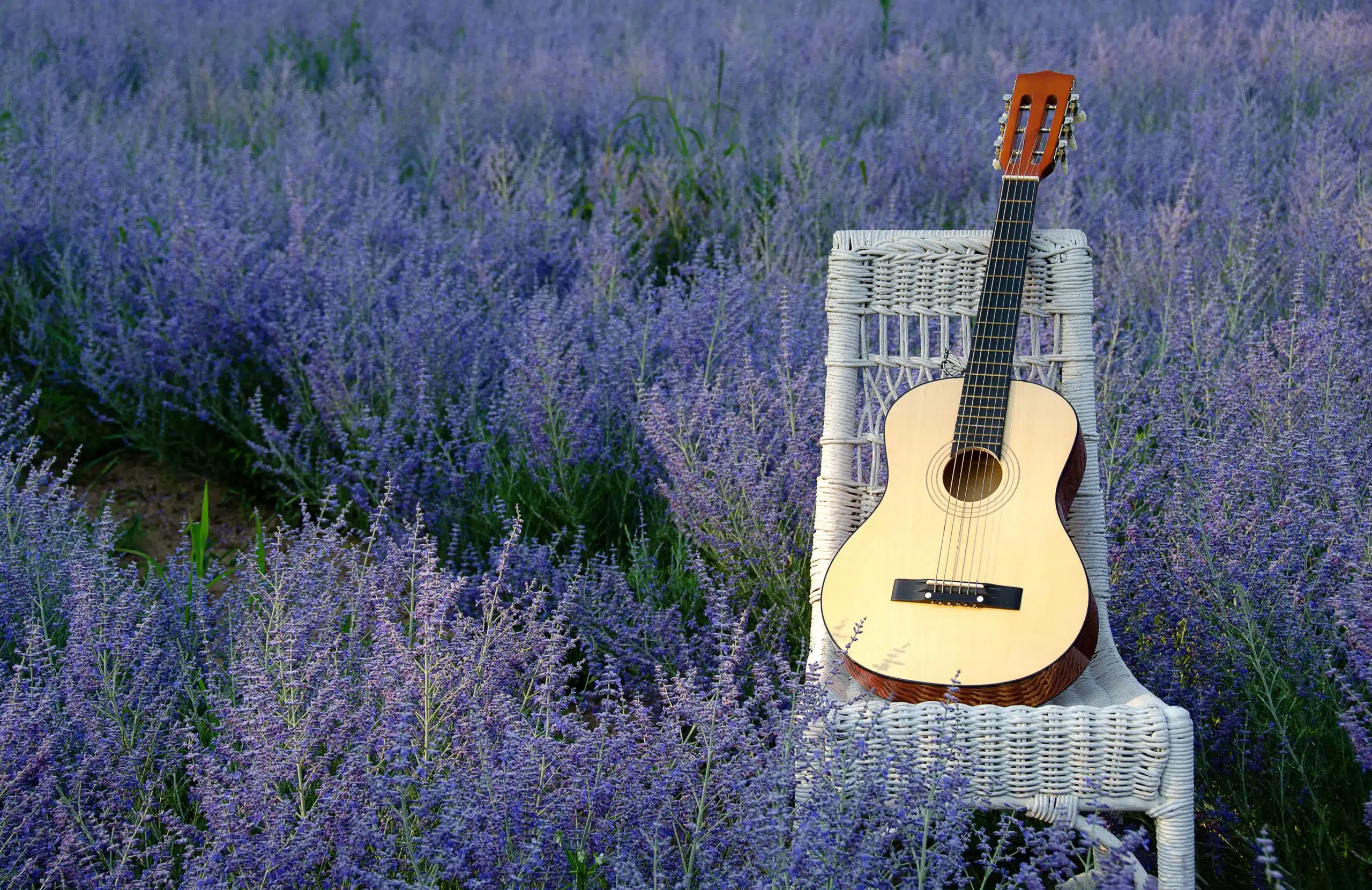
“Love, the Musician” by Francesco Redi (Edmund Gosse, Translator)
Love is the Minstrel; for in God’s own sight,
The master of all melody, he stands,
And holds a golden rebeck in his hands,
And leads the chorus of the saints in light;
But ever and anon those chambers bright
Detain him not, for down to these low lands
He flies, and spreads his musical commands,
And teaches men some fresh divine delight.
For with his bow he strikes a single chord
Across a soul, and wakes in it desire
To grow more pure and lovely, and aspire
To that ethereal country where, outpoured
From myriad stars that stand before the Lord,
Love’s harmonies are like a flame of fire.
“Love” by Torquato Tasso (John Herman Merivale, Translator)
Love, the great master of true eloquence,
Disdains the tribute of a vulgar tongue.
Cold are the words, and vain the affected song
Of him whose boasted passion is pretence.
The favoured few that to his court belong
With noblest gifts the mighty god presents;
Their vigorous accents chain the admiring sense,
And their warm words in torrents stream along.
Oft too—O wondrous excellence of Love!—
Unuttered vows and sighs and accents broken
With far more force the gentle bosom move
Than smoothest phrase with courtly action spoken.
E’en Silence oft has found the power to prove
Both word and prayer, when it is true love’s token.
Famous Poems About Marriage
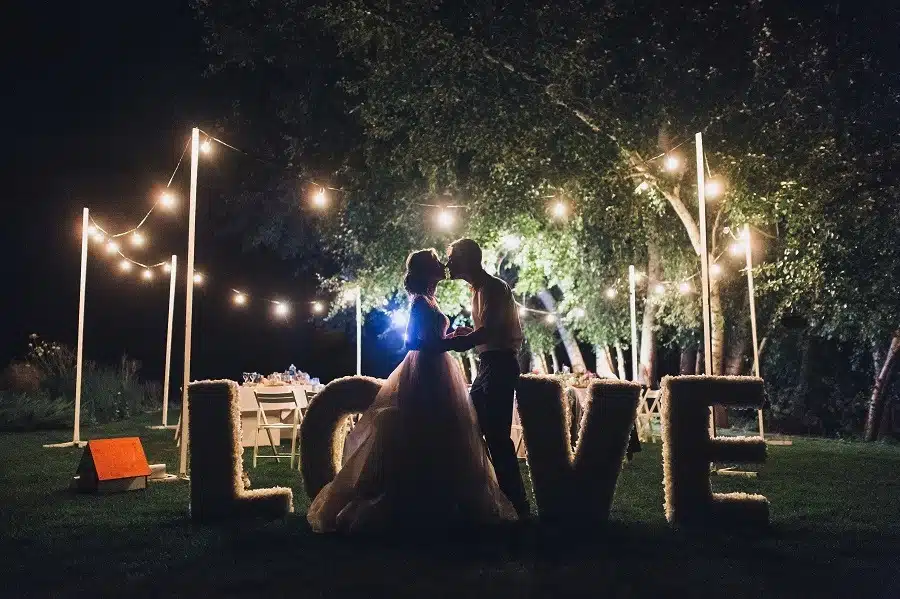
“The Golden Wedding” by David Gray
O love, whose patient pilgrim feet
Life’s longest path have trod,
Whose ministry hath symbolled sweet
The dearer love of God,—
The sacred myrtle wreathes again
Thine altar, as of old;
And what was green with summer then,
Is mellowed, now, to gold.
Not now, as then, the Future’s face
Is flushed with fancy’s light;
But Memory, with a milder grace,
Shall rule the feast to-night.
Blest was the sun of joy that shone,
Nor less the blinding shower—
The bud of fifty years agone
Is Love’s perfected flower.
O Memory, ope thy mystic door!
O dream of youth, return!
And let the lights that gleamed of yore
Beside this altar burn!
The past is plain; ’t was Love designed
E’en Sorrow’s iron chain,
And Mercy’s shining thread has twined
With the dark warp of Pain.
So be it still. O thou who hast
That younger bridal blest,
Till the May-morn of love has passed
To evening’s golden west,
Come to this later Cana, Lord,
And, at thy touch divine,
The water of that earlier board
To-night shall turn to wine.
“Hail Matrimony, Made of Love!” by William Blake
Hail Matrimony, made of Love!
To thy wide gates how great a drove
On purpose to be yok’d do come;
Widows and Maids and Youths also,
That lightly trip on beauty’s toe,
Or sit on beauty’s bum.
Hail fingerfooted lovely Creatures!
The females of our human natures,
Formèd to suckle all Mankind.
’Tis you that come in time of need,
Without you we should never breed,
Or any comfort find.
For if a Damsel’s blind or lame,
Or Nature’s hand has crook’d her frame,
Or if she’s deaf, or is wall-eyed;
Yet, if her heart is well inclin’d,
Some tender lover she shall find
That panteth for a Bride.
The universal Poultice this,
To cure whatever is amiss
In Damsel or in Widow gay!
It makes them smile, it makes them skip;
Like birds, just curèd of the pip,
They chirp and hop away.
Then come, ye maidens! come, ye swains!
Come and be cur’d of all your pains
In Matrimony’s Golden Cage—
“The Lovers’ Litany” by Rudyard Kipling
Eyes of grey—a sodden quay,
Driving rain and falling tears,
As the steamer puts to sea
In a parting storm of cheers.
Sing, for Faith and Hope are high—
None so true as you and I—
Sing the Lovers’ Litany:—
“Love like ours can never die!”
Eyes of black—a throbbing keel,
Milky foam to left and right;
Whispered converse near the wheel
In the brilliant tropic night.
Cross that rules the Southern Sky!
Stars that sweep, and turn, and fly
Hear the Lovers’ Litany:—
“Love like ours can never die!”
Eyes of brown—a dusty plain
Split and parched with heat of June.
Flying hoof and tightened rein,
Hearts that beat the ancient tune.
Side by side the horses fly,
Frame we now the old reply
Of the Lovers’ Litany:—
“Love like ours can never die!”
Eyes of blue—the Simla Hills
Silvered with the moonlight hoar;
Pleading of the waltz that thrills,
Dies and echoes round Benmore.
“Mabel,” “Officers,” “Good-bye,”
Glamour, wine, and witchery—
On my soul’s sincerity,
“Love like ours can never die!”
Maidens, of your charity,
Pity my most luckless state.
Four times Cupid’s debtor I—
Bankrupt in quadruplicate.
Yet, despite my evil case,
An a maiden showed me grace,
Four-and-forty times would I
Sing the Lovers’ Litany:—
“Love like ours can never die!”

“Love and Harmony Combine” by William Blake
Love and harmony combine,
And around our souls entwine
While thy branches mix with mine,
And our roots together join.
Joys upon our branches sit,
Chirping loud and singing sweet;
Like gentle streams beneath our feet
Innocence and virtue meet.
Thou the golden fruit dost bear,
I am clad in flowers fair;
Thy sweet boughs perfume the air,
And the turtle buildeth there.
There she sits and feeds her young’
Sweet I hear her mournful song;
And thy lovely leaves among,
There is love, I hear his tongue.
There his charming nest doth lay,
There he sleeps the night away;
There he sports along the day,
And doth among our branches play.
“Love’s Philosophy” by Percy Bysshe Shelley
The fountains mingle with the river
And the rivers with the ocean,
The winds of heaven mix for ever
With a sweet emotion;
Nothing in the world is single,
All things by a law divine
In one another’s being mingle—
Why not I with thine?
See the mountains kiss high heaven,
And the waves clasp one another;
No sister-flower would be forgiven
If it disdain’d its brother;
And the sunlight clasps the earth,
And the moonbeams kiss the sea—
What are all these kissings worth,
If thou kiss not me?
“Love’s Omnipresence” by Joshua Sylvester
Were I as base as is the lowly plain,
And you, my Love, as high as heaven above,
Yet should the thoughts of me your humble swain
Ascend to heaven, in honour of my Love.
Were I as high as heaven above the plain,
And you, my Love, as humble and as low
As are the deepest bottoms of the main,
Whereso’er you were, with you my love should go.
Were you the earth, dear Love, and I the skies,
My love should shine on you like to the sun,
And look upon you with ten thousand eyes
Till heaven wax’d blind, and till the world were done.
Whereso’er I am, below, or else above you,
Whereso’er you are, my heart shall truly love you.
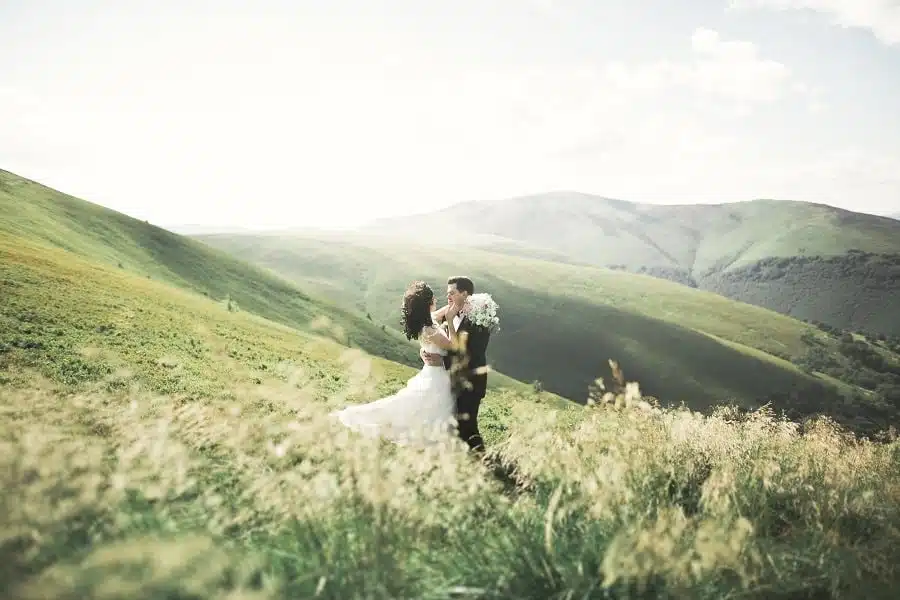
“Love on the Mountain” by Thomas Boyd
My Love comes down from the mountain
Through the mists of dawn;
I look, and the star of the morning
From the sky is gone.
My love comes down form the mountain,
At dawn, dewy-sweet;
Did you step from the star to the mountain,
O little white feet?
O whence came your twining tresses
And your shining eyes,
But out of the gold of the morning
And the blue of the skies?
The misty morning is burning
In the sun’s red fire,
And the heart in my breast is burning
And lost in desire.
I follow you into the valley
But no word can I say;
To the East or the West I will follow
Till the dusk of my day.
“The Silence of Love” by George William (“A. E.”) Russell
I could praise you once with beautiful words ere you came
And entered my life with love in a wind of flame.
I could lure with a song from afar my bird to its nest,
But with pinions drooping together silence is best.
In the land of beautiful silence the winds are laid,
And life grows quietly one in the cloudy shade.
I will not waken the passion that sleeps in the heart,
For the winds that blew us together may blow us apart.
Fear not the stillness; for doubt and despair shall cease
With the gentle voices guiding us into peace.
Our dreams will change as they pass through the gates of gold,
And Quiet, the tender shepherd, shall keep the fold.
“To His Love” by William Shakespeare
Shall I compare thee to a summer’s day?
Thou art more lovely and more temperate:
Rough winds do shake the darling buds of May,
And summer’s lease hath all too short a date;
Sometime too hot the eye of heaven shines,
And often is his gold complexion dimm’d;
And every fair from fair sometime declines,
By chance, or nature’s changing course, untrimm’d.
But thy eternal summer shall not fade,
Nor lose possession of that fair thou owest;
Nor shall Death brag thou wanderest in his shade,
When in eternal lines to time thou growest:—
So long as men can breathe, or eyes can see,
So long lives this, and this gives life to thee.

“A Serenade” by Edward Coate Pinkney
Look out upon the stars, my love,
And shame them with thine eyes,
On which, than on the lights above,
There hang more destinies.
Night’s beauty is the harmony
Of blending shades and light;
Then, Lady, up,—look out, and be
A sister to the night!—
Sleep not!—thine image wakes for aye,
Within my watching breast:
Sleep not!—from her soft sleep should fly,
Who robs all hearts of rest.
Nay, Lady, from thy slumbers break,
And make this darkness gay,
With looks, whose brightness well might make
Of darker nights a day.
“Beauty” by Edward Hovell-Thurlow, Lord Thurlow
‘T is much immortal beauty to admire,
But more immortal beauty to withstand;
The perfect soul can overcome desire,
If beauty with divine delight be scanned.
For what is beauty but the blooming child
Of fair Olympus, that in night must end,
And be forever from that bliss exiled,
If admiration stand too much its friend?
The wind may be enamored of a flower,
The ocean of the green and laughing shore,
The silver lightning of a lofty tower,—
But must not with too near a love adore;
Or flower and margin and cloud-cappèd tower
Love and delight shall with delight devour!
“My Love in Her Attire Doth Show Her Wit” by Anonymous
My Love in her attire doth show her wit,
It doth so well become her:
For every season she hath dressings fit,
For Winter, Spring, and Summer.
No beauty she doth miss
When all her robes are on;
But Beauty’s self she is
When all her robes are gone.

“Dream Love” by George William (“A. E.”) Russell
I did not deem it half so sweet
To feel thy gentle hand,
As in a dream thy soul to greet
Across wide leagues of land.
Untouched more near to draw to you
Where, amid radiant skies,
Glimmered thy plumes of iris hue,
My Bird of Paradise.
Let me dream only with my heart,
Love first, and after see:
Know thy diviner counterpart
Before I kneel to thee.
So in thy motions all expressed
Thy angel I may view:
I shall not on thy beauty rest,
But beauty’s self in you.
“All for Love” by Lord Byron
O talk not to me of a name great in story;
The days of our youth are the days of our glory;
And the myrtle and ivy of sweet two-and-twenty
Are worth all your laurels, though ever so plenty.
What are garlands and crowns to the brow that is wrinkled?
‘Tis but as a dead flower with May-dew besprinkled:
Then away with all such from the head that is hoary—
What care I for the wreaths that can only give glory?
O Fame! if I e’er took delight in thy praises,
‘Twas less for the sake of thy high-sounding phrases,
Than to see the bright eyes of the dear one discover
She thought that I was not unworthy to love her.
There chiefly I sought thee, there only I found thee;
Her glance was the best of the rays that surround thee;
When it sparkled o’er aught that was bright in my story,
I knew it was love, and I felt it was glory.
“To My Wife” by Bernard Barton
The butterfly, which sports on gaudy wing;
The brawling brooklet, lost in foam and spray,
As it goes dancing on its idle way;
The sunflower, in broad daylight glistening;
Are types of her who in the festive ring
Lives but to bask in fashion’s vain display,
And glittering through her bright but useless day,
“Flaunts, and goes down a disregarded thing!”
Thy emblem, Lucy, is the busy bee,
Whose industry for future hours provides;
The gentle streamlet, gladding as it glides
Unseen along; the flower which gives the lea
Fragrance and loveliness, are types of thee,
And of the active worth thy modest merit hides.

“New Love, New Life” by Amy Levy
I
She, who so long has lain
Stone-stiff with folded wings,
Within my heart again
The brown bird wakes and sings.
Brown nightingale, whose strain
Is heard by day, by night,
She sings of joy and pain,
Of sorrow and delight.
II
’Tis true,—in other days
Have I unbarred the door;
He knows the walks and ways
Love has been here before.
Love blest and love accurst
Was here in days long past;
This time is not the first,
But this time is the last.
“Lovers’ Infiniteness” by John Donne
If yet I have not all thy love,
Dear, I shall never have it all;
I cannot breathe one other sigh, to move,
Nor can intreat one other tear to fall;
And all my treasure, which should purchase thee,
Sighs, tears, and oaths, and letters I have spent;
Yet no more can be due to me,
Than at the bargain made was meant.
If then thy gift of love were partial,
That some to me, some should to others fall,
Dear, I shall never have thee all.
Or if then thou gavest me all,
All was but all, which thou hadst then;
But if in thy heart since there be or shall
New love created be by other men,
Which have their stocks entire, and can in tears,
In sighs, in oaths, and letters, outbid me,
This new love may beget new fears,
For this love was not vow’d by thee.
And yet it was, thy gift being general;
The ground, thy heart, is mine; what ever shall
Grow there, dear, I should have it all.
Yet I would not have all yet.
He that hath all can have no more;
And since my love doth every day admit
New growth, thou shouldst have new rewards in store;
Thou canst not every day give me thy heart,
If thou canst give it, then thou never gavest it;
Love’s riddles are, that though thy heart depart,
It stays at home, and thou with losing savest it;
But we will have a way more liberal,
Than changing hearts, to join them; so we shall
Be one, and one another’s all.
“The Vision of Love” by George William (“A. E.”) Russell
The twilight fleeted away in pearl on the stream,
And night, like a diamond done, stood still in our dream.
Your eyes like burnished stones or as stars were bright
With the sudden vision that made us one with the night.
We loved in infinite spaces, forgetting here
The breasts that were lit with life and the lips so near;
Till the wizard willows waved in the wind and drew
Me away from the fulness of love and down to you.
Our love was so vast that it filled the heavens up:
But the soft white form I held was an empty cup,
When the willows called me back to earth with their sigh,
And we moved as shades through the deep that was you and I.
